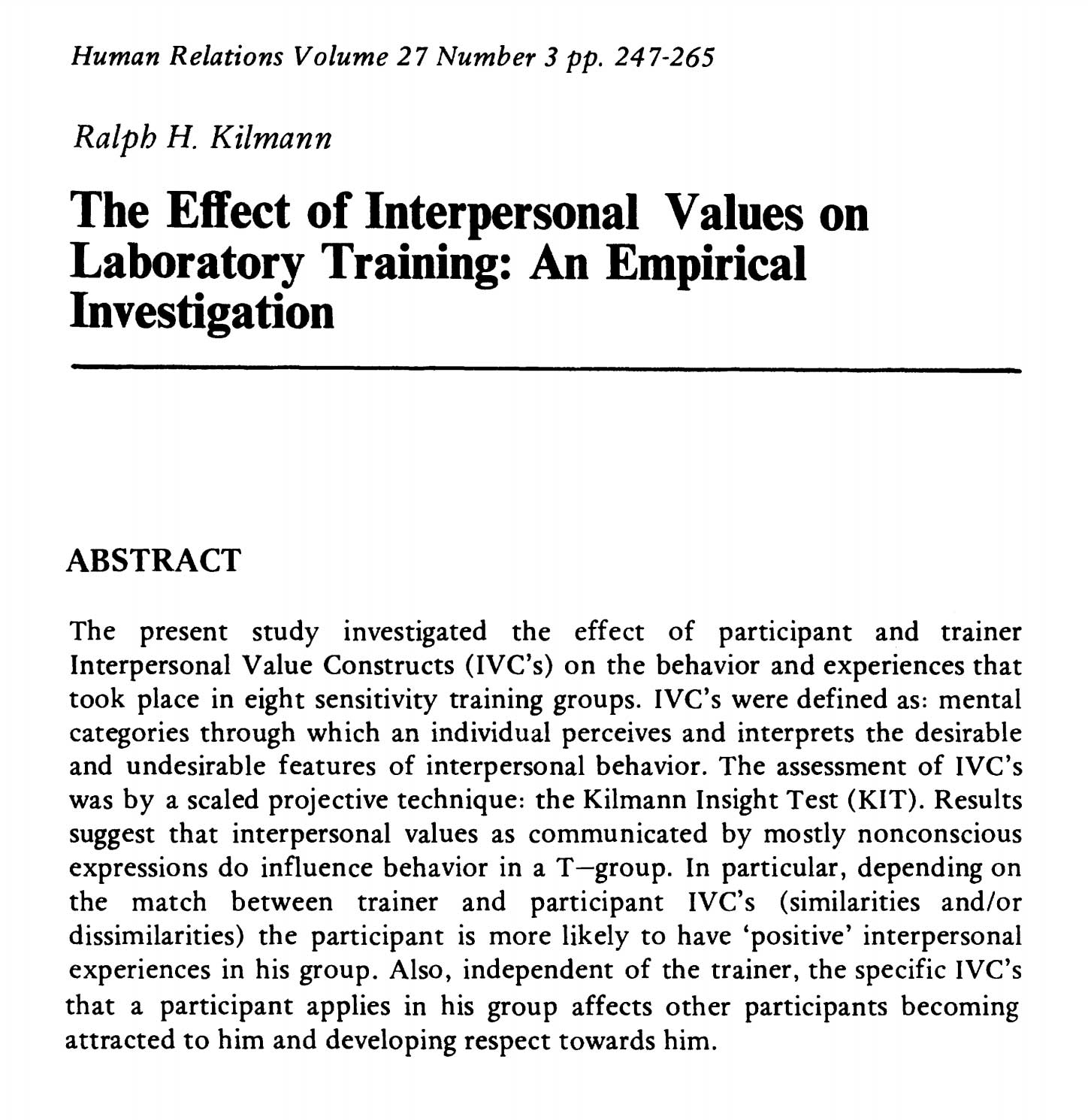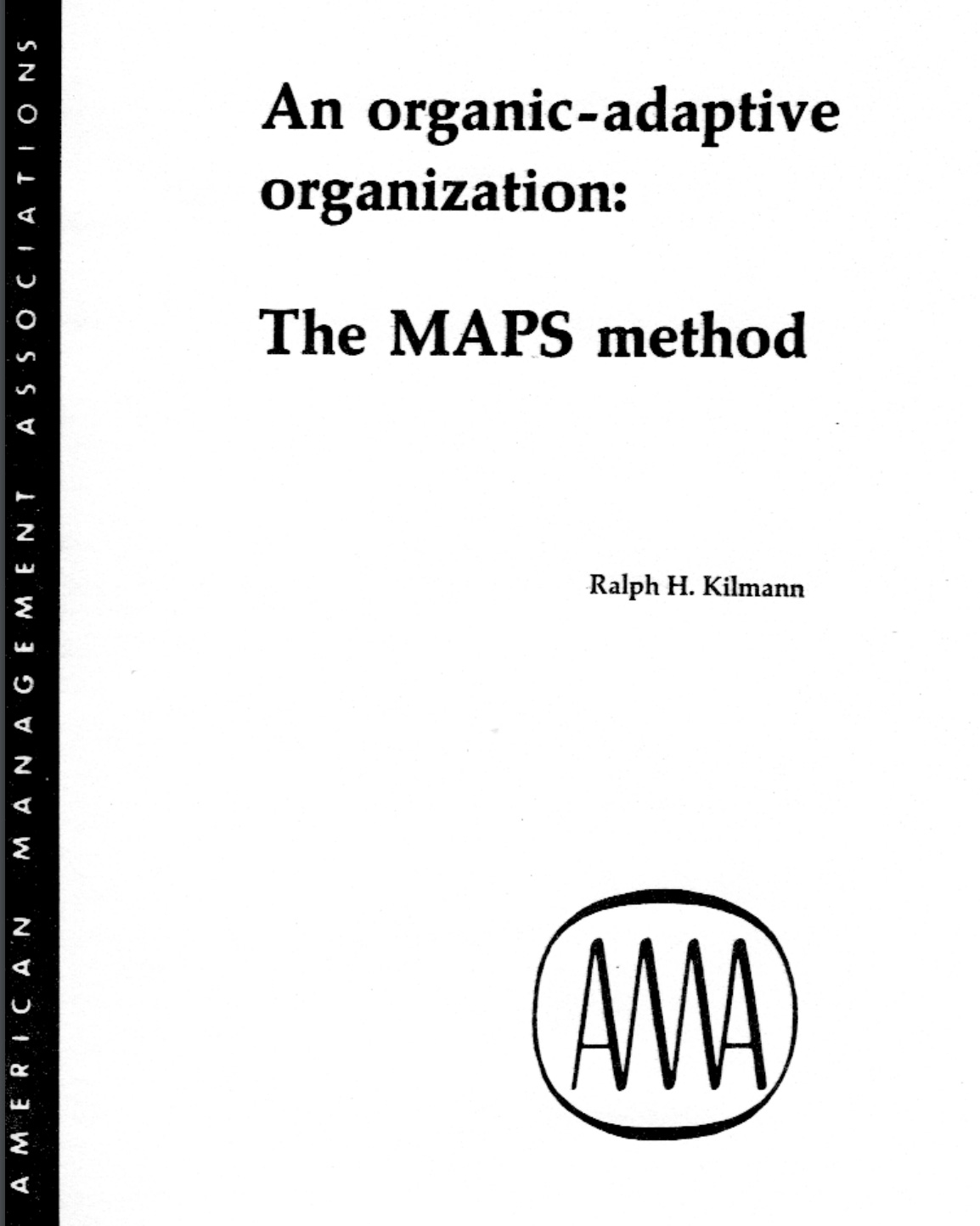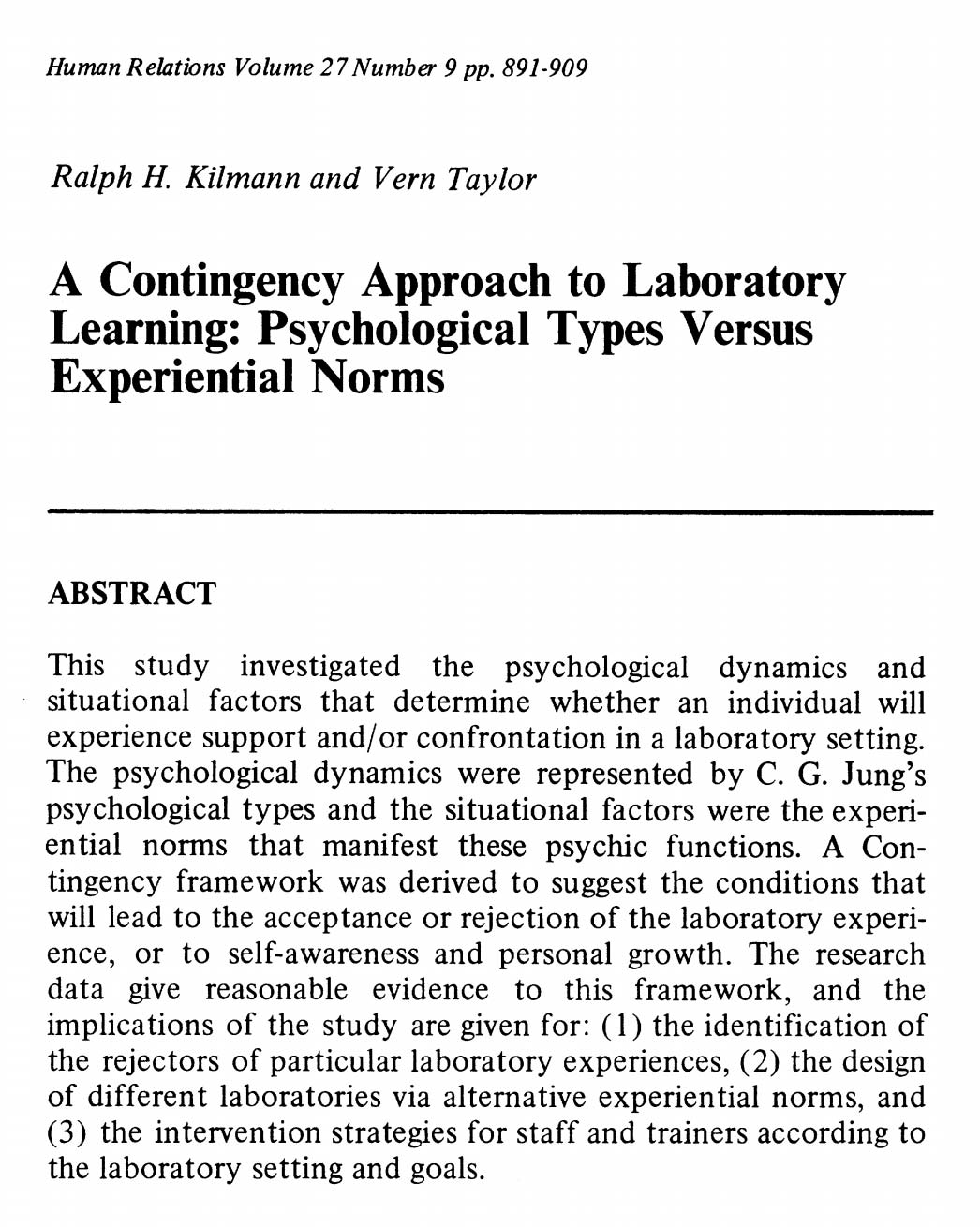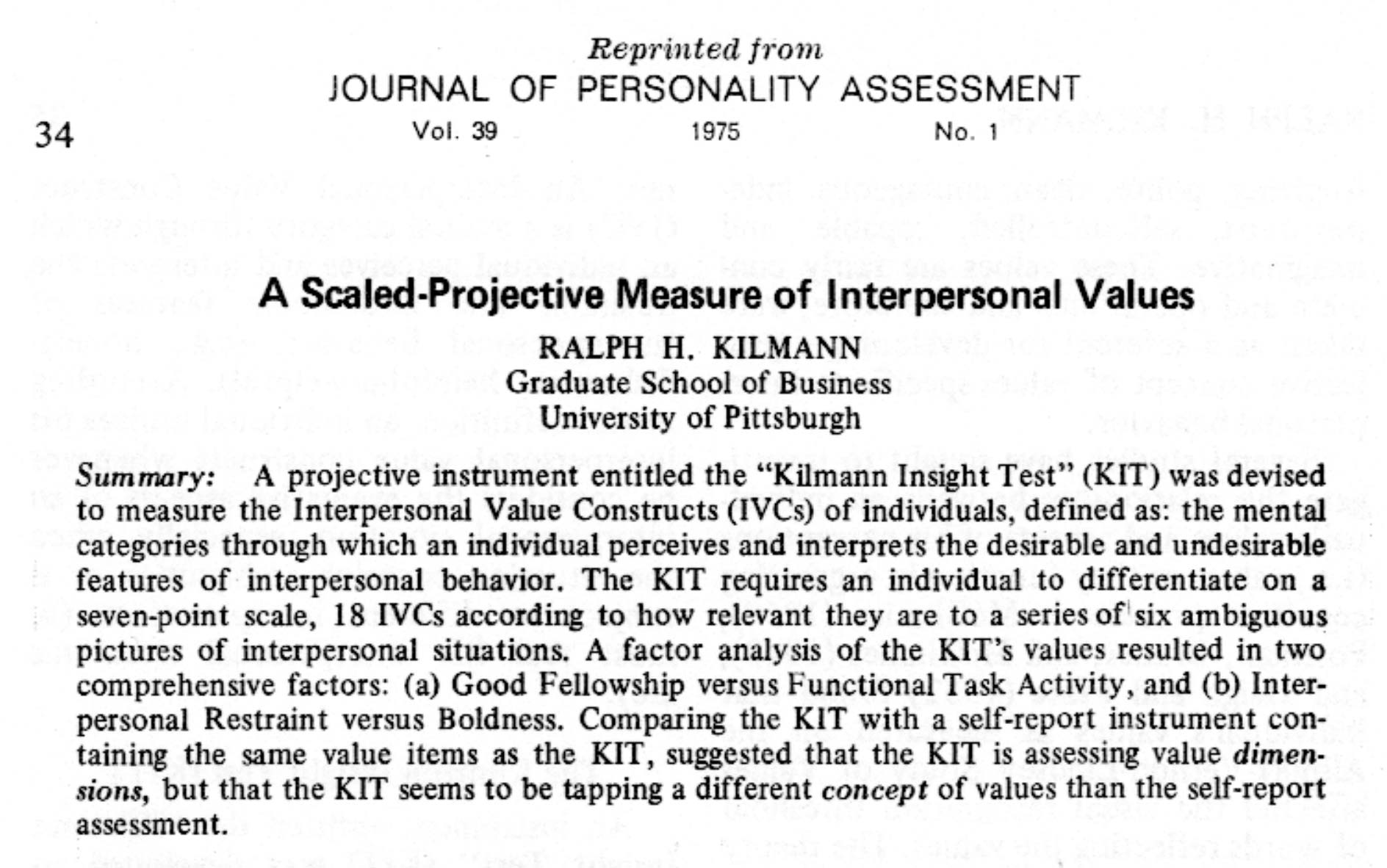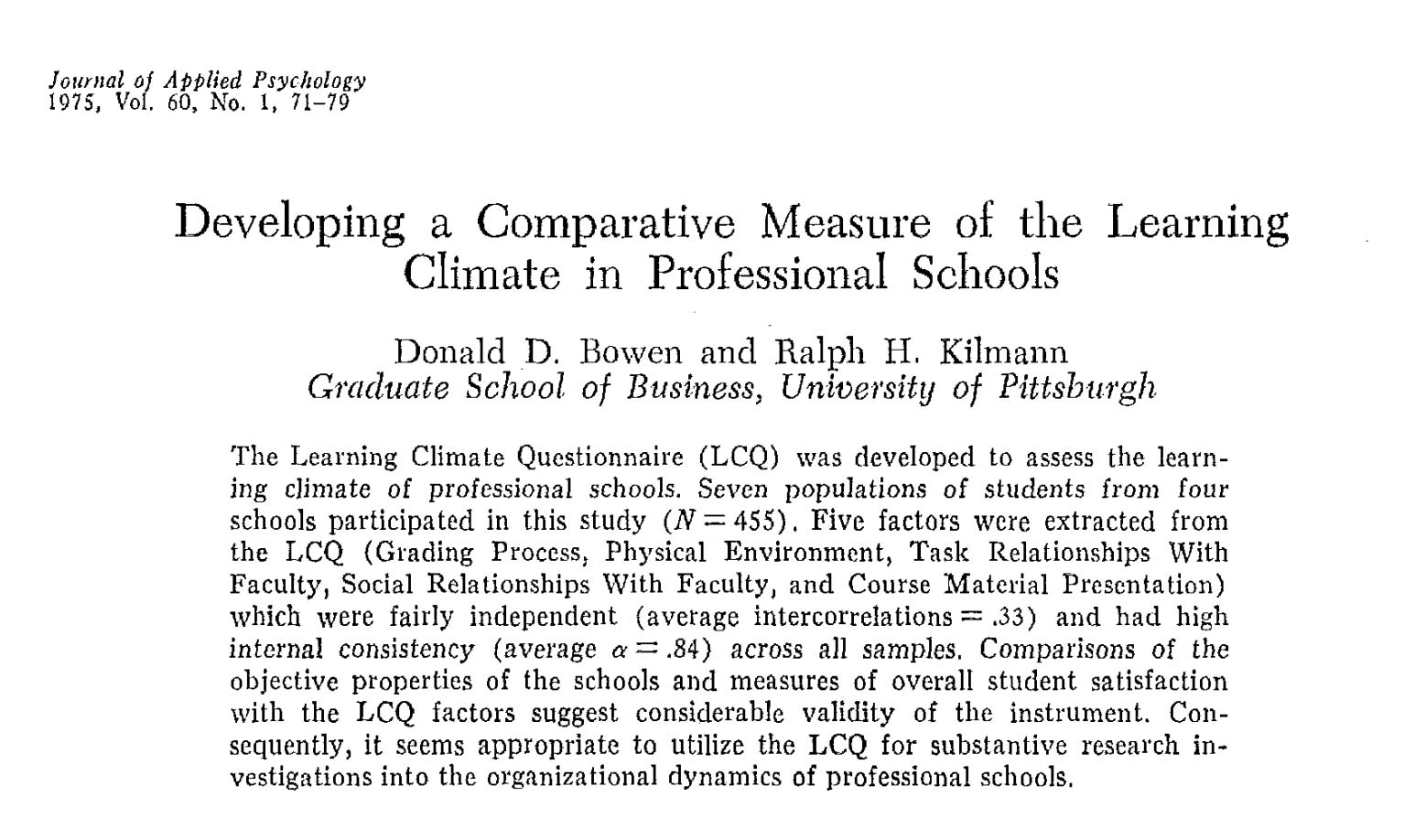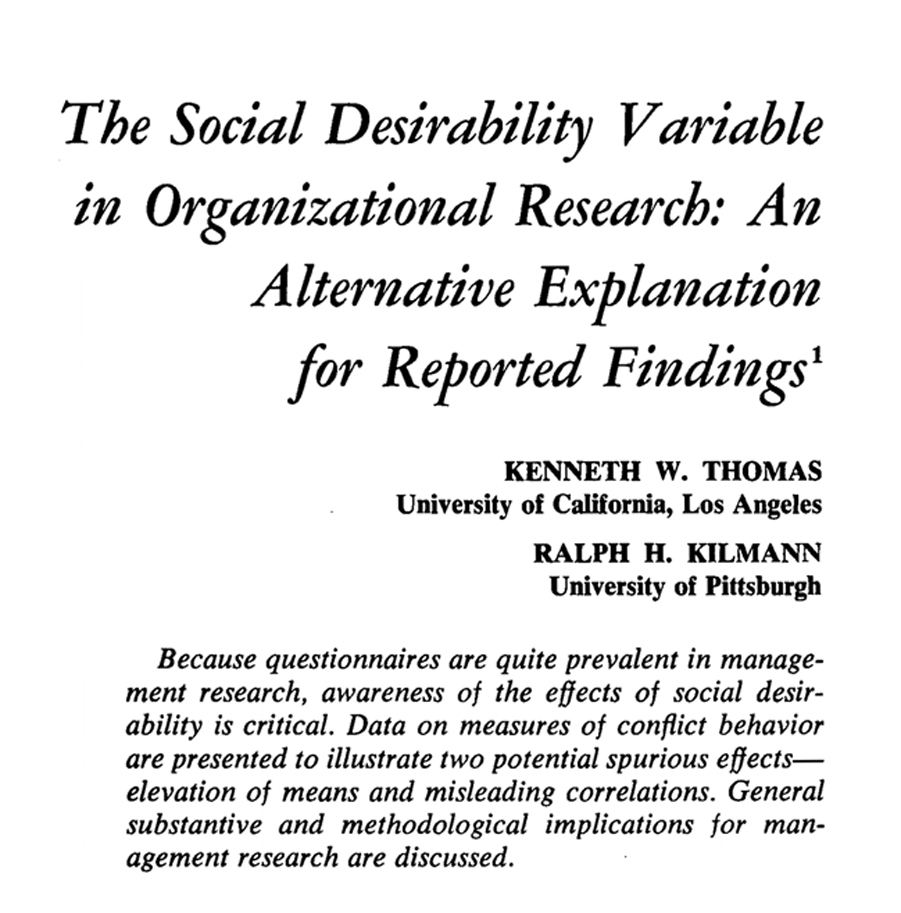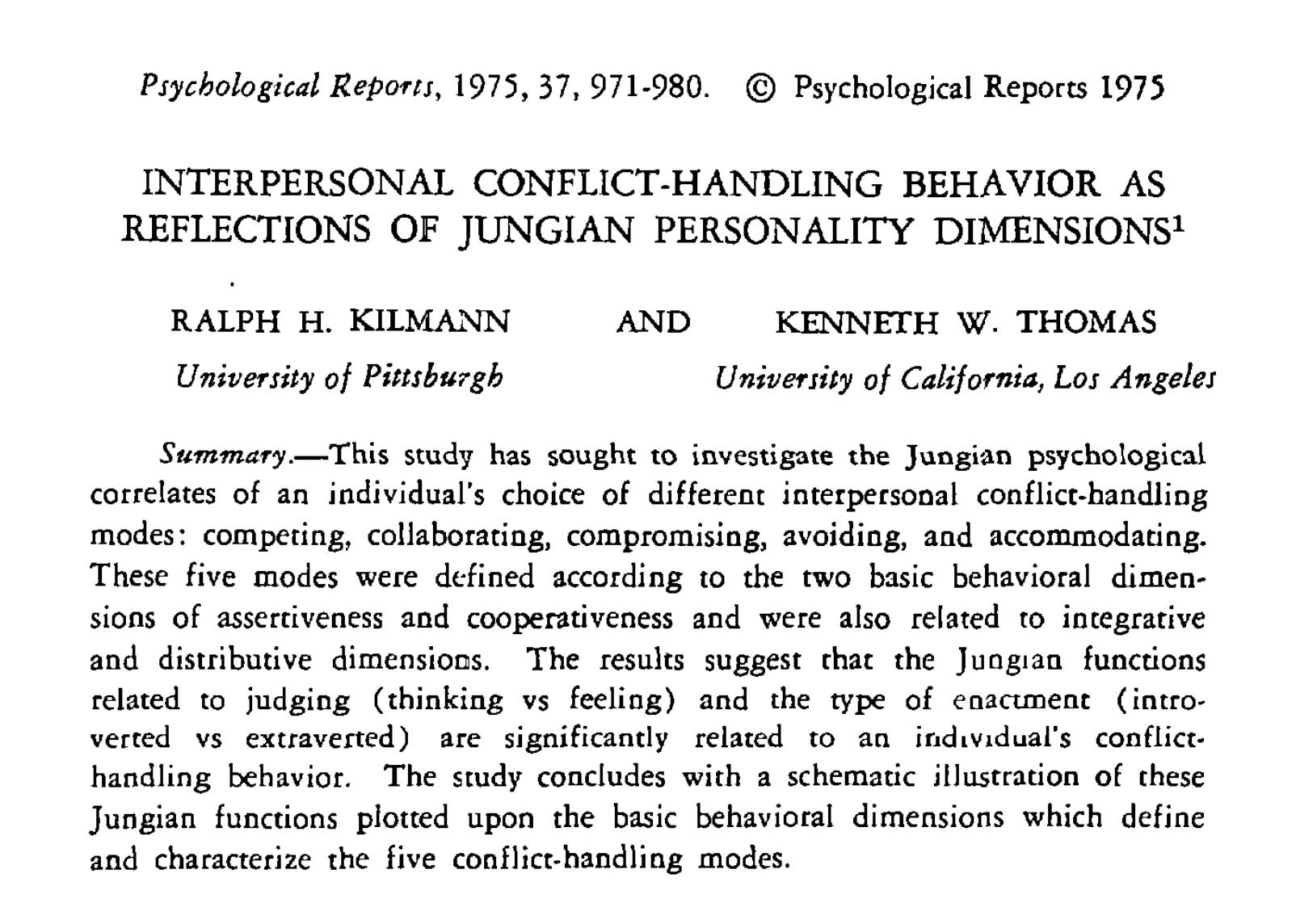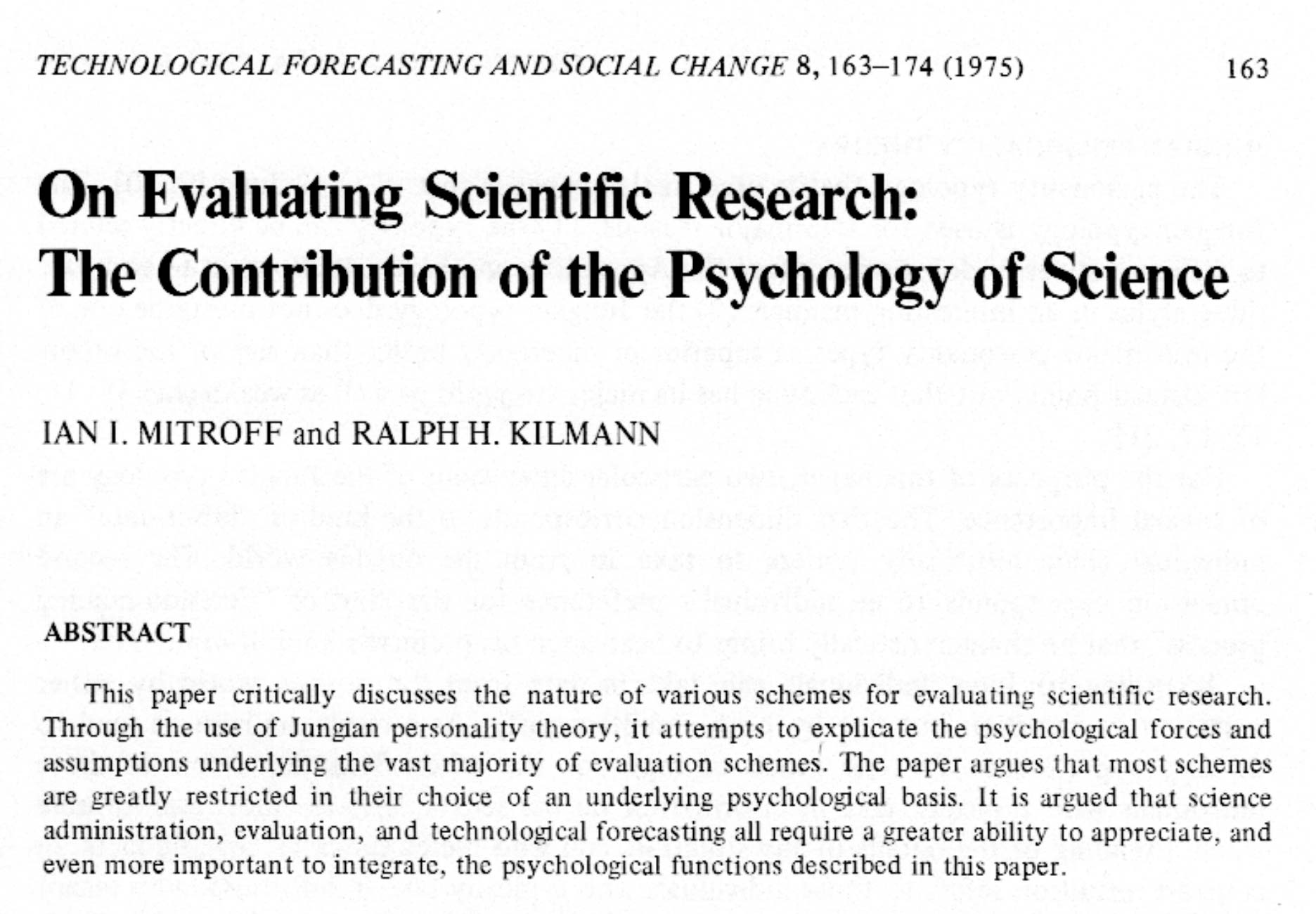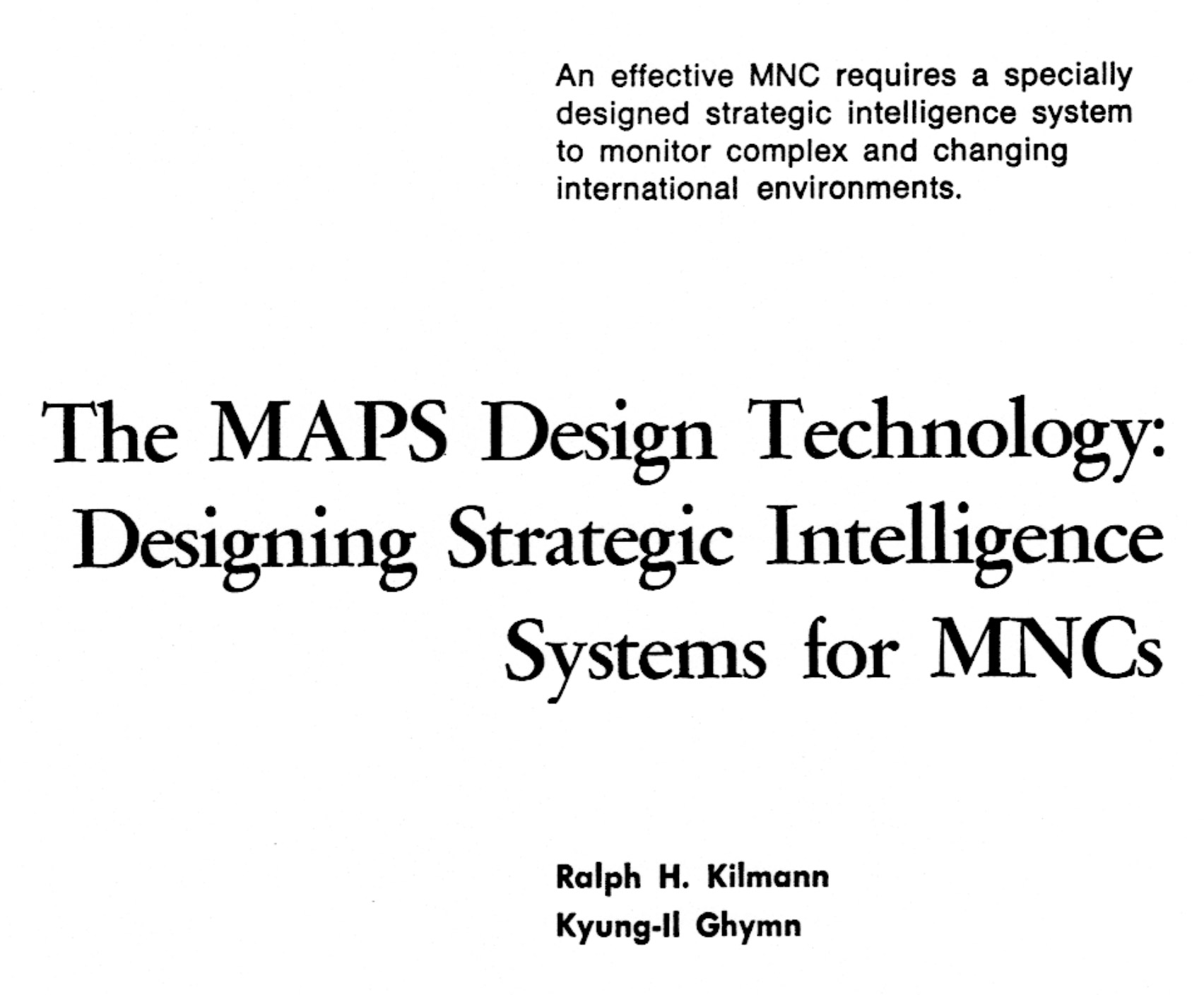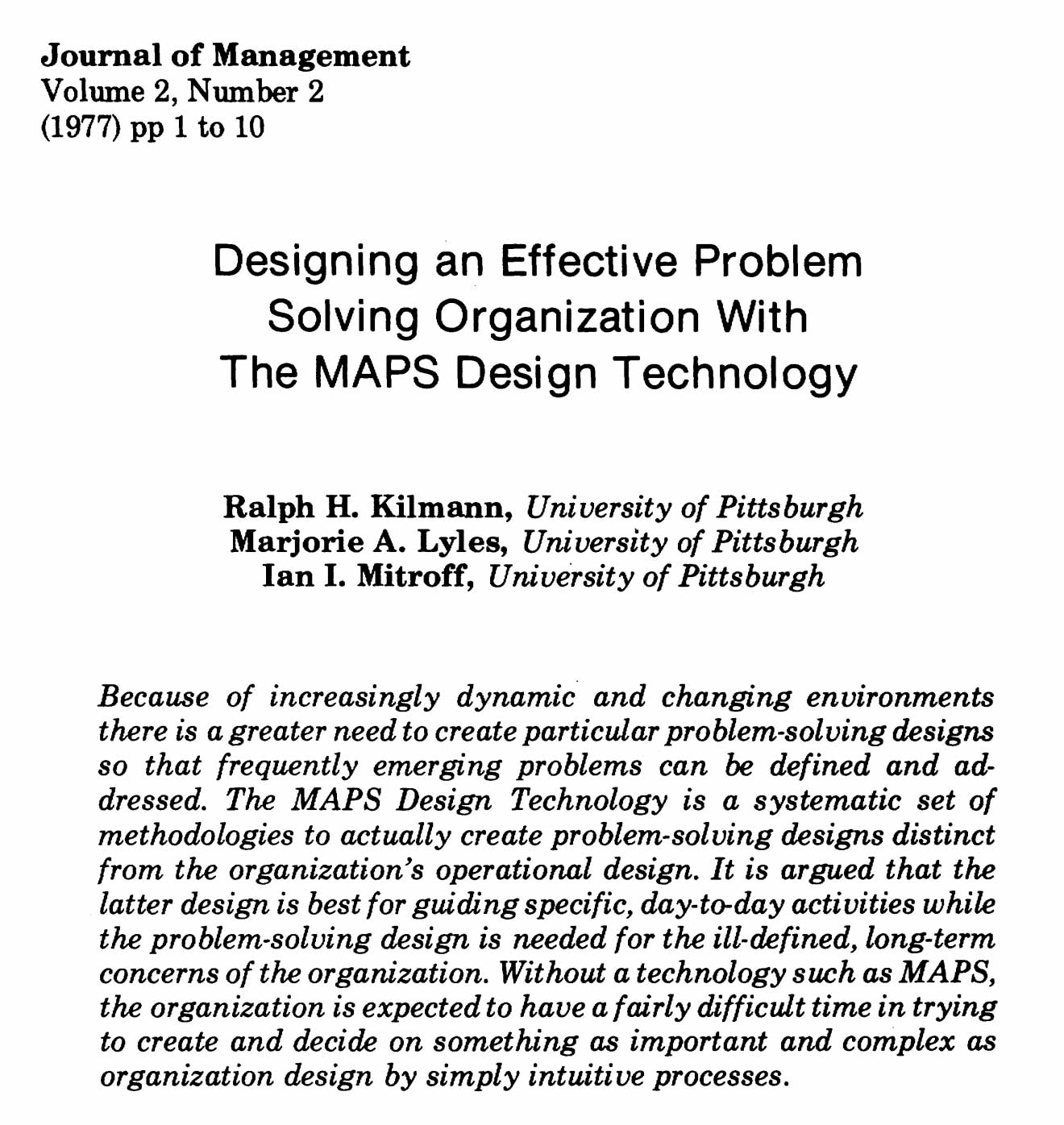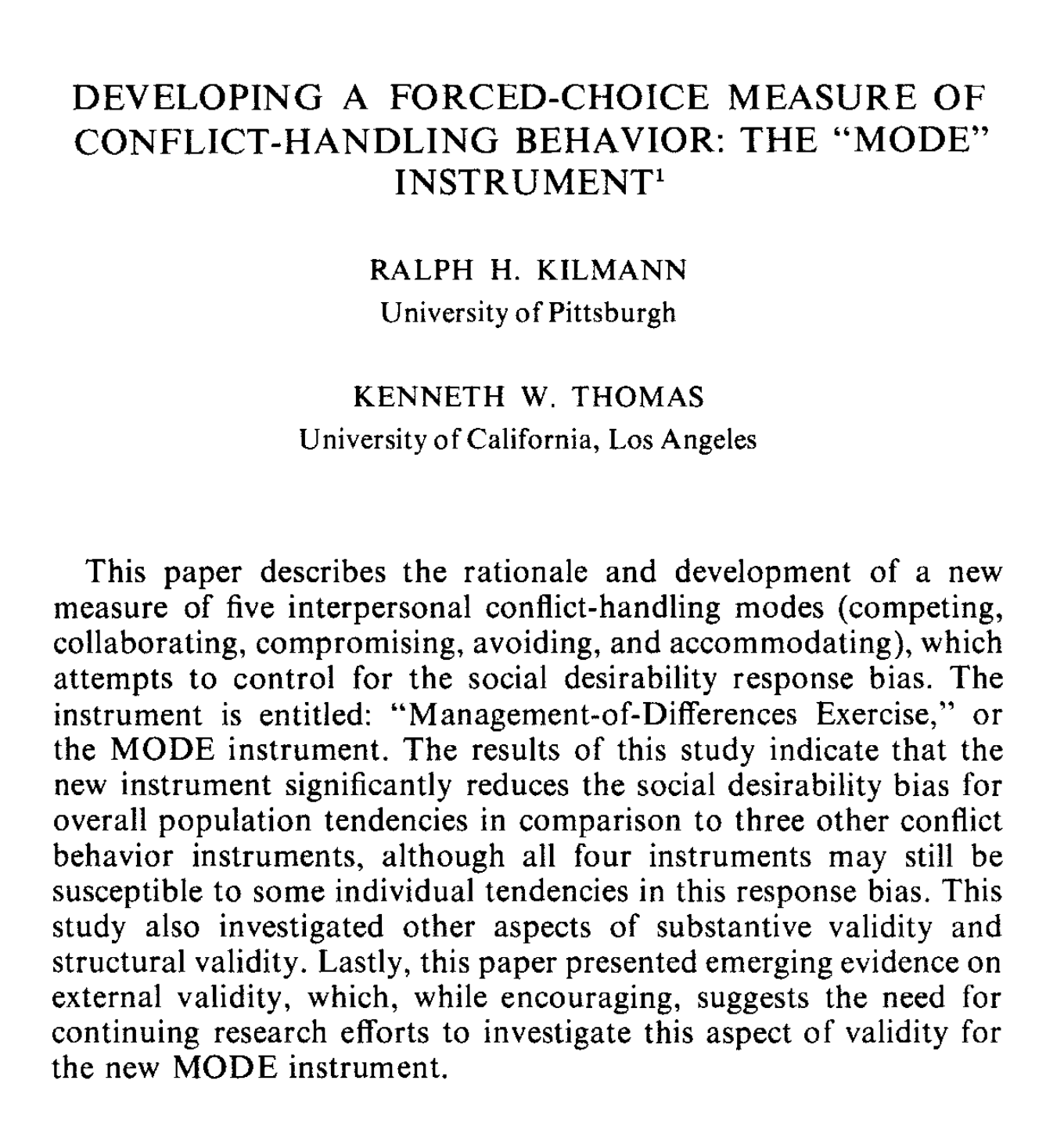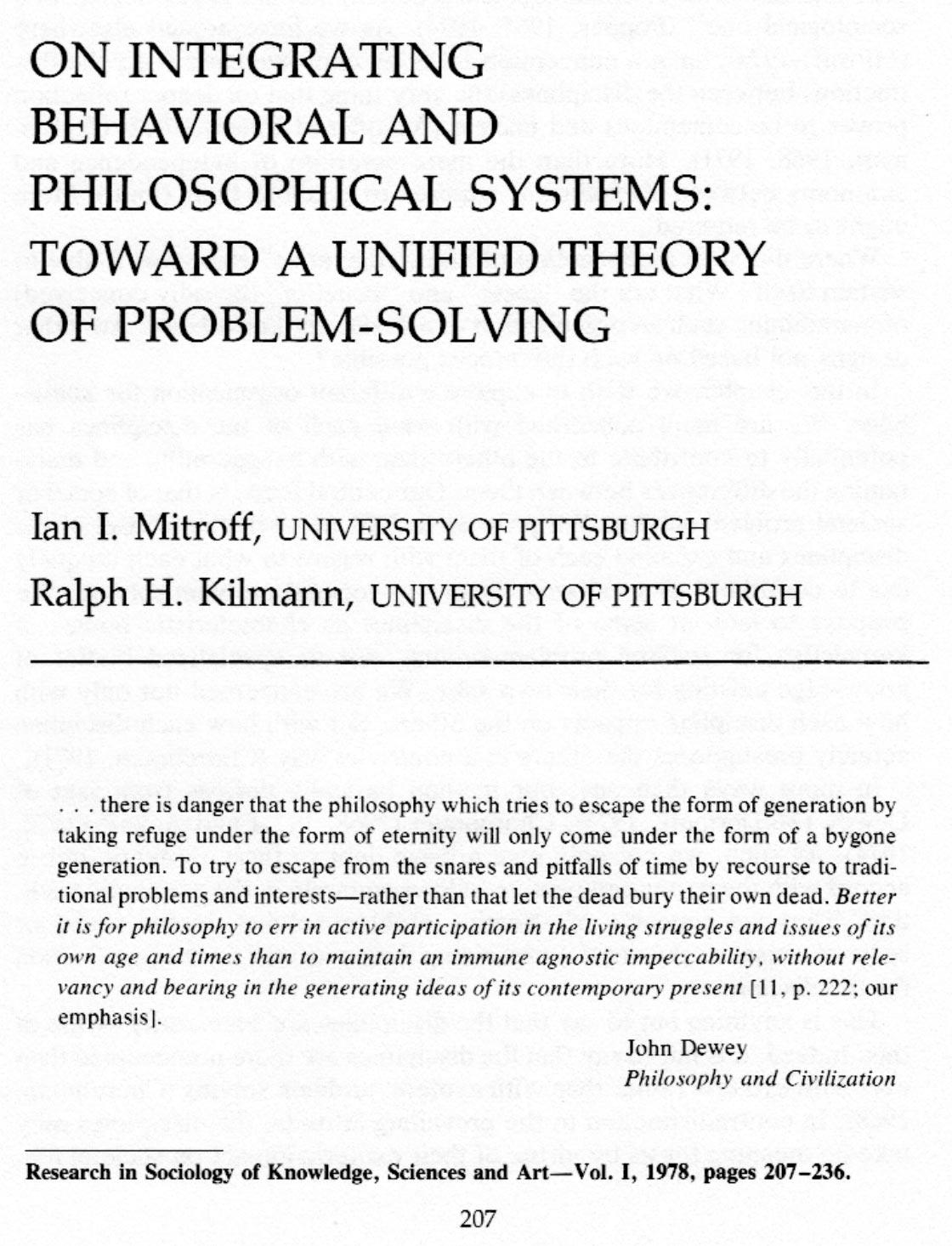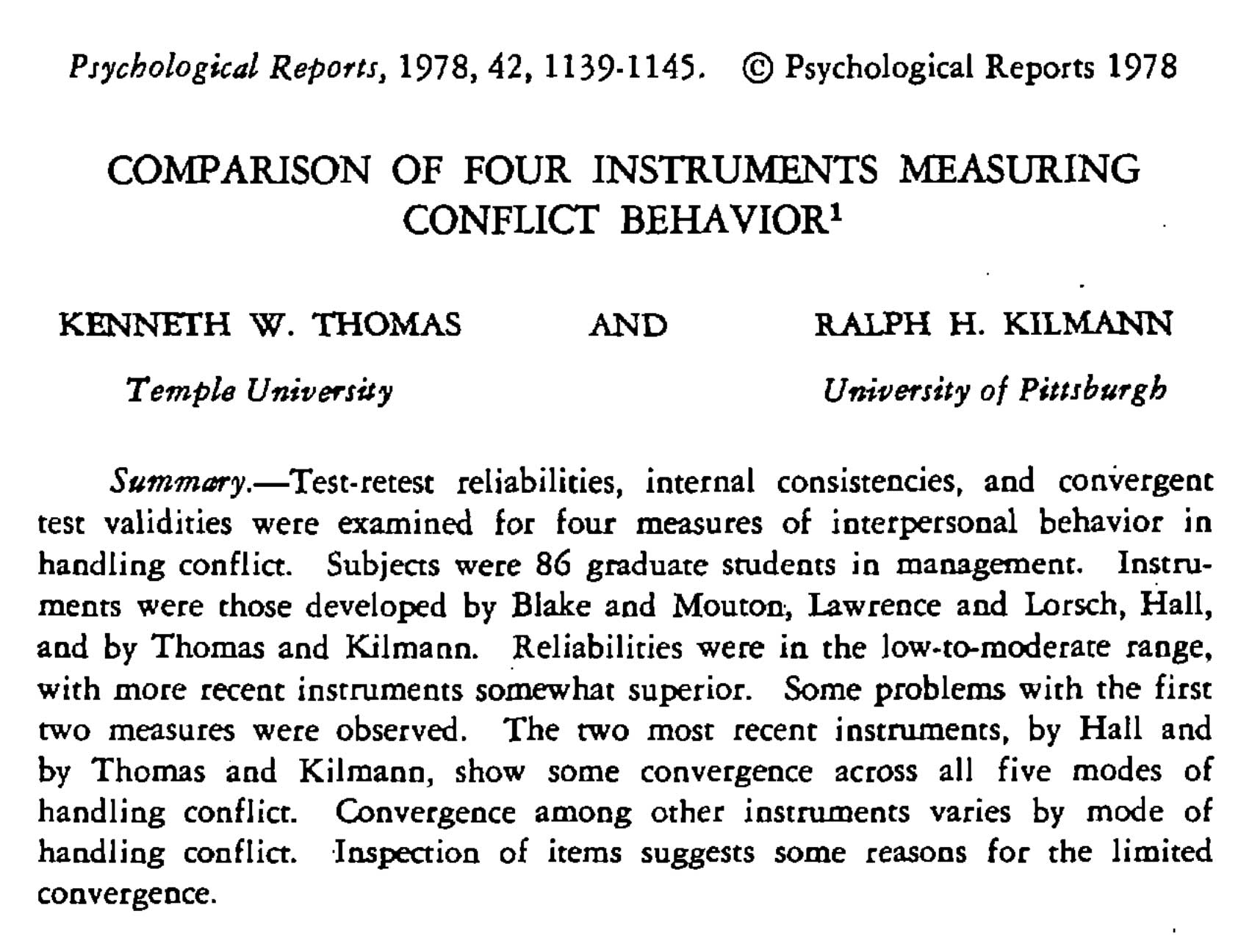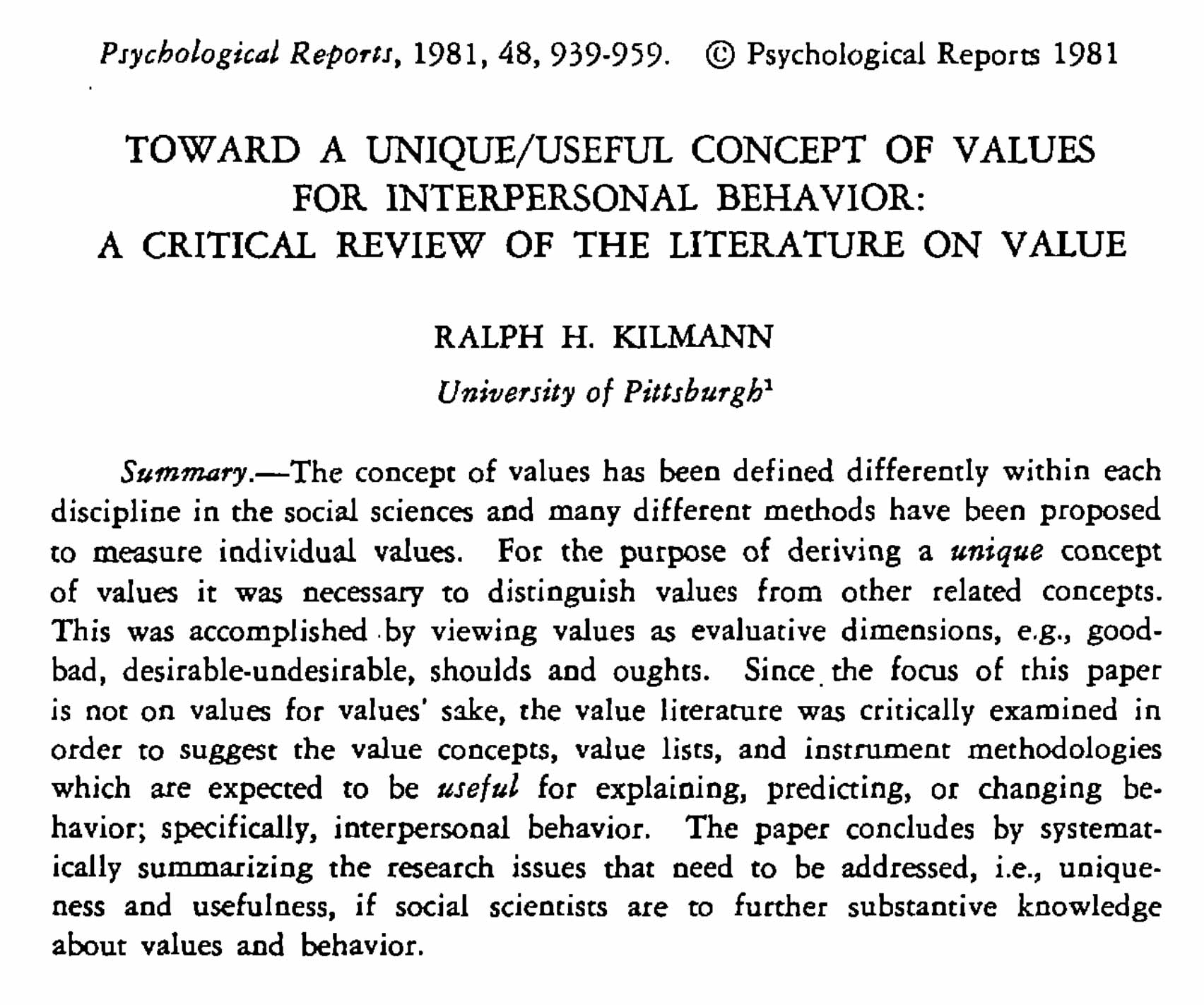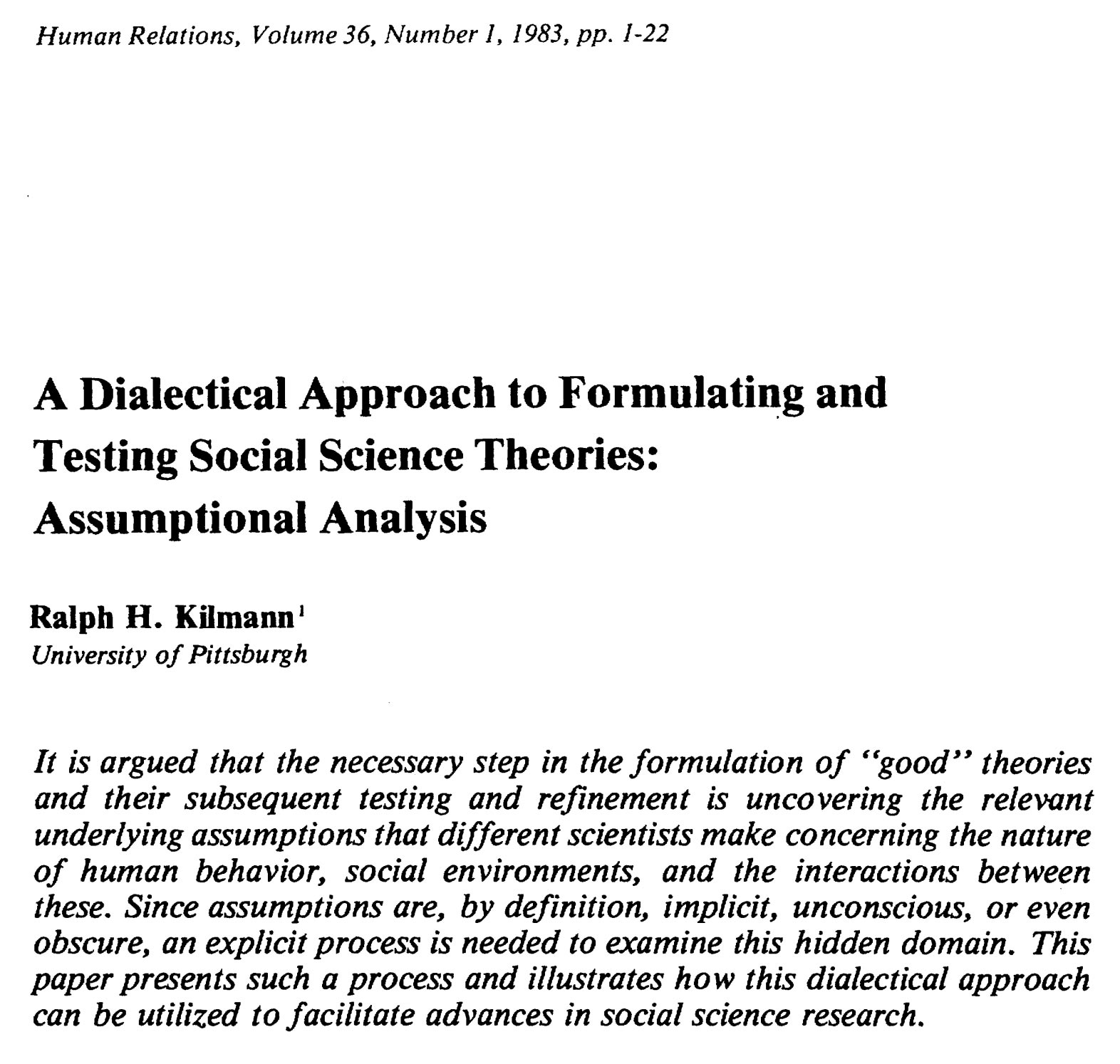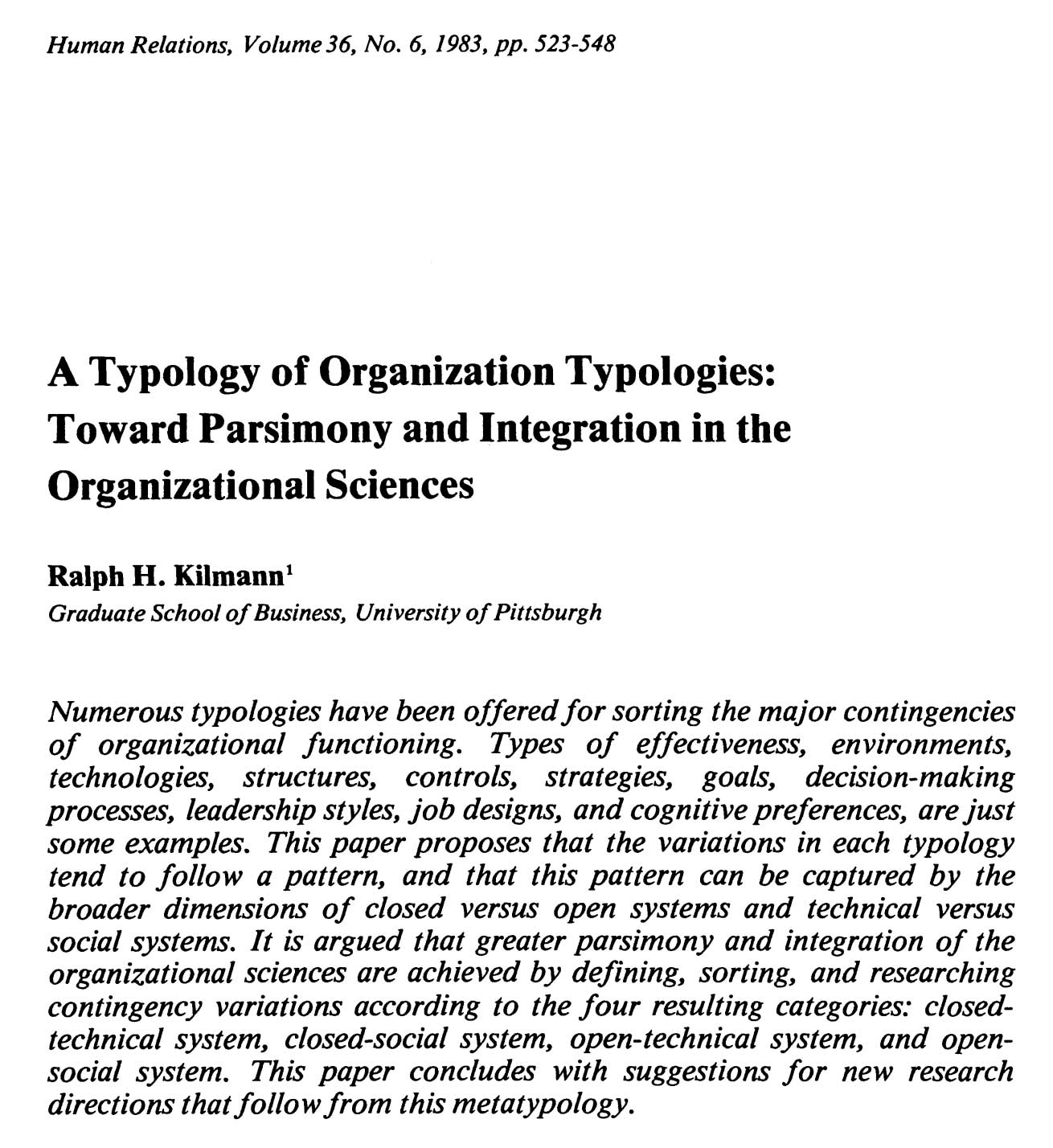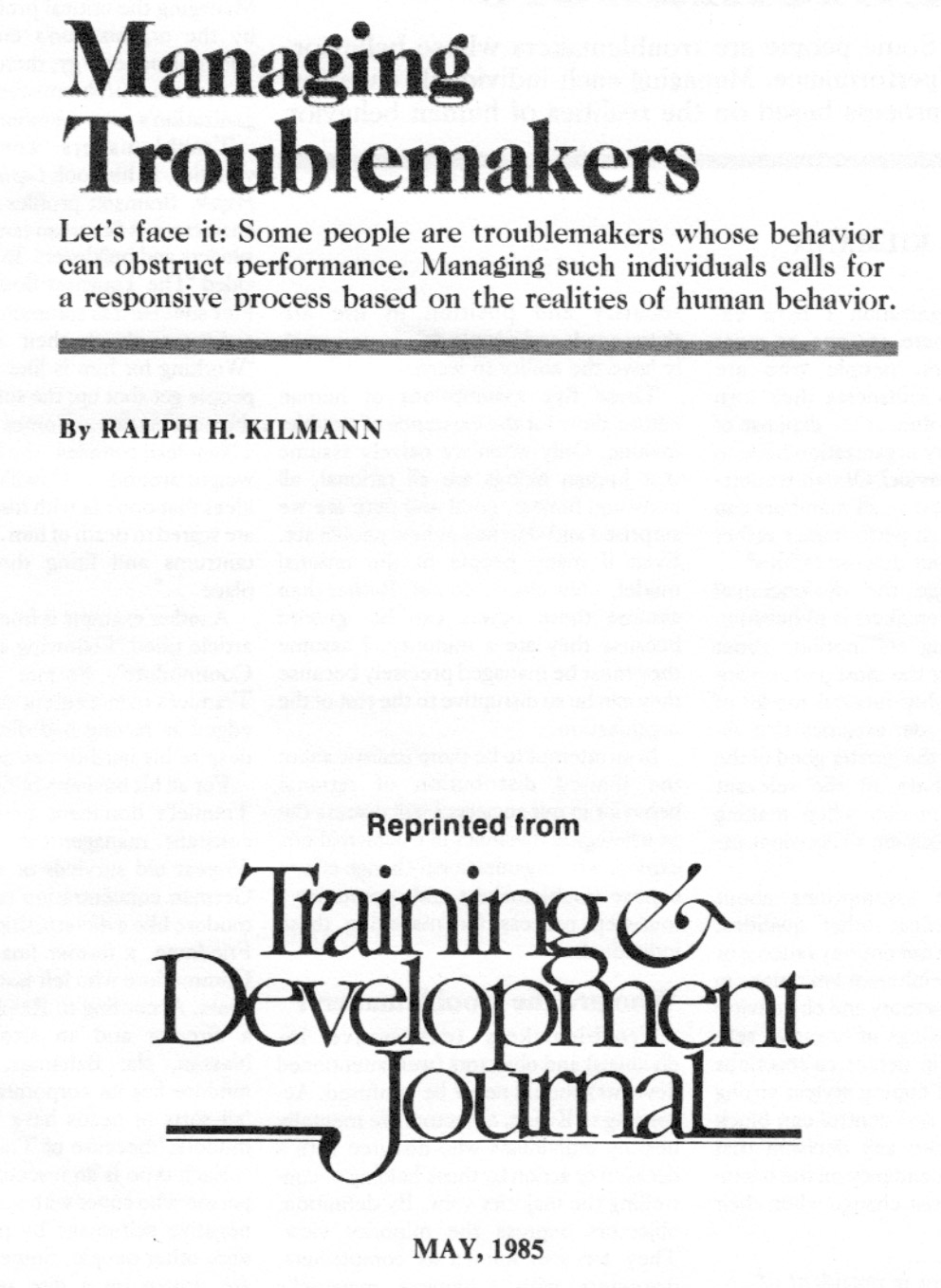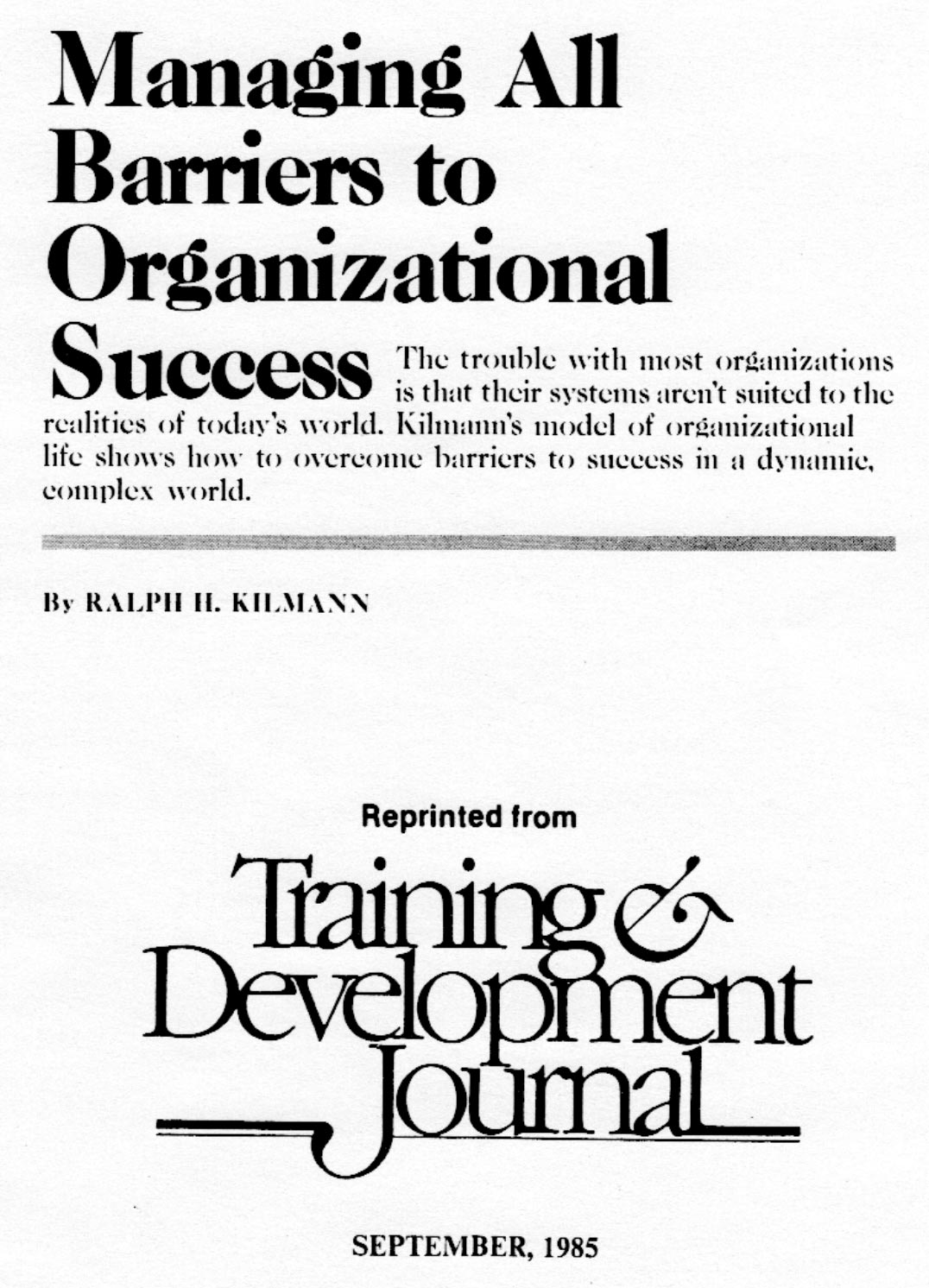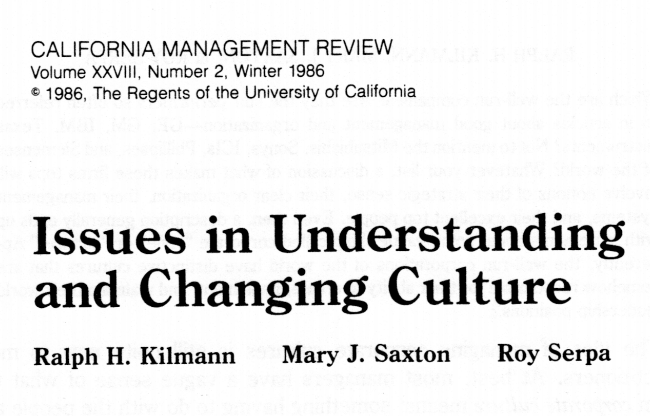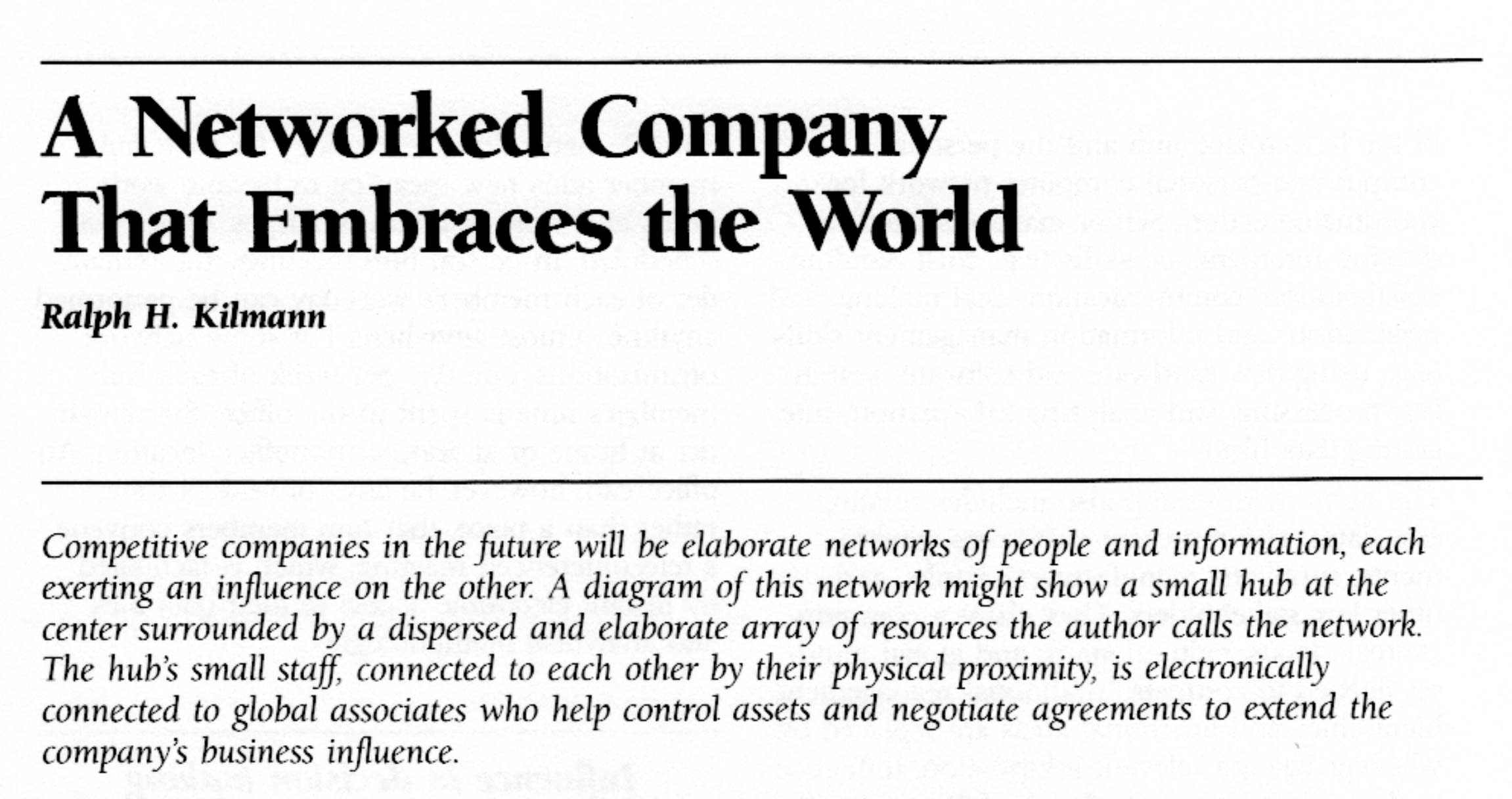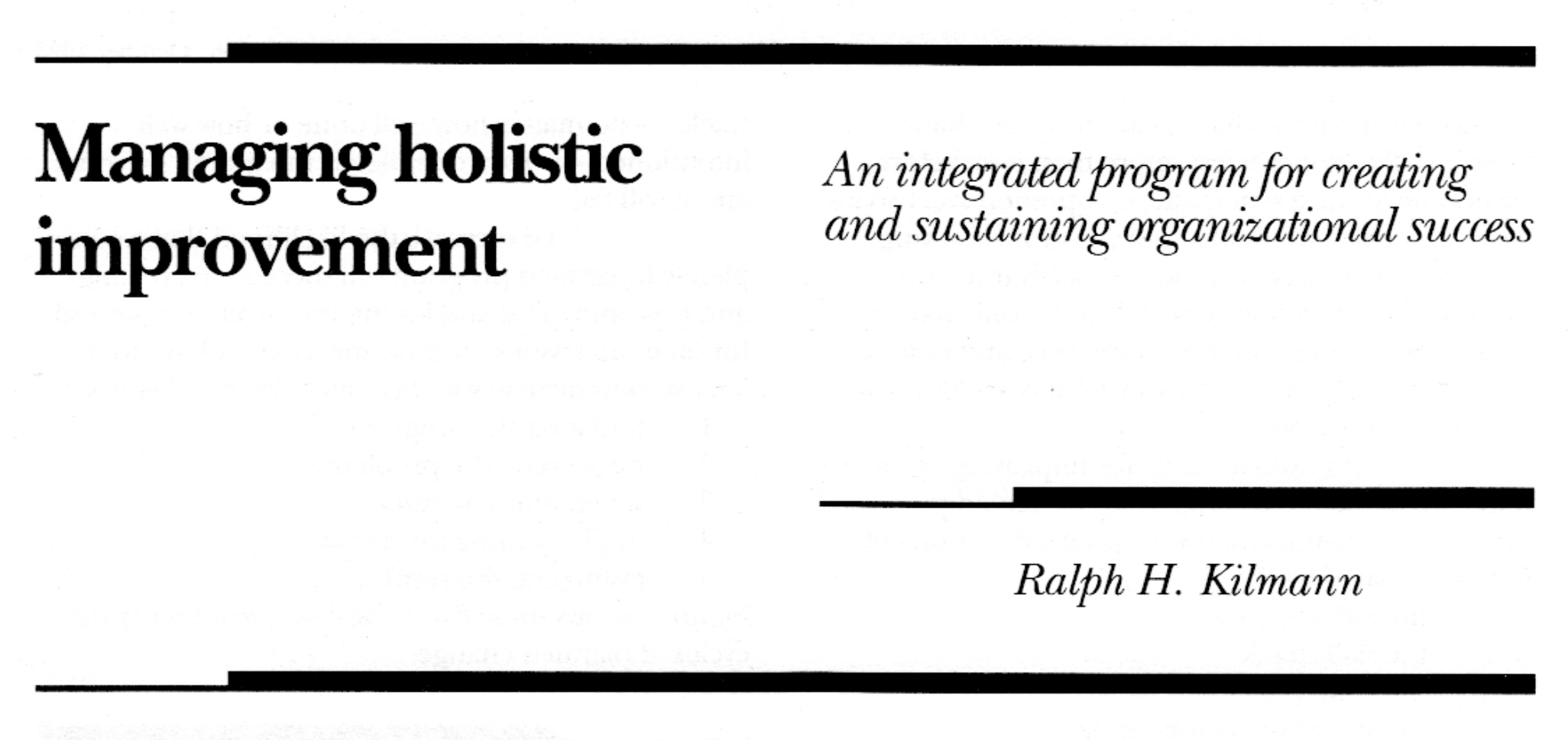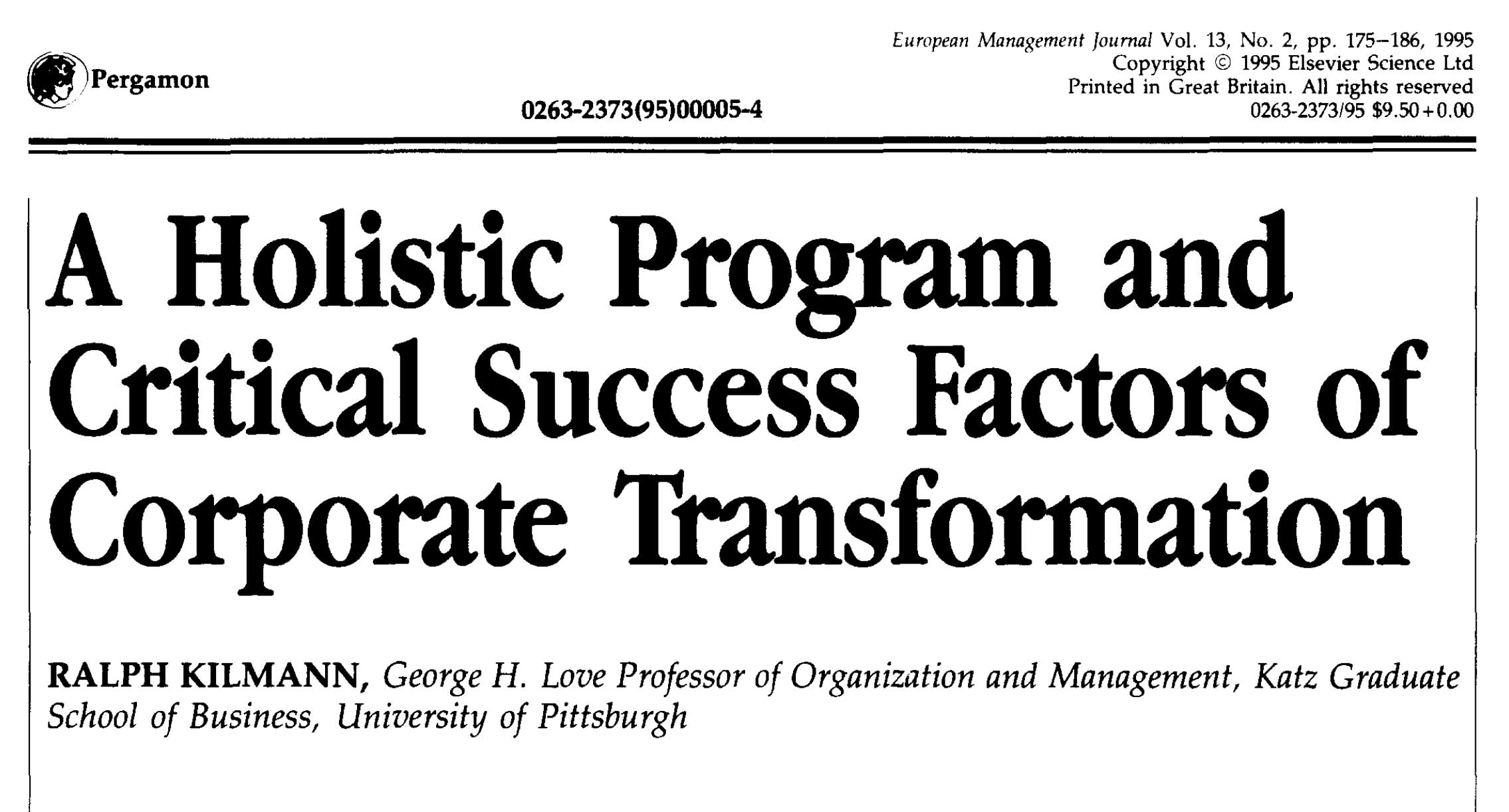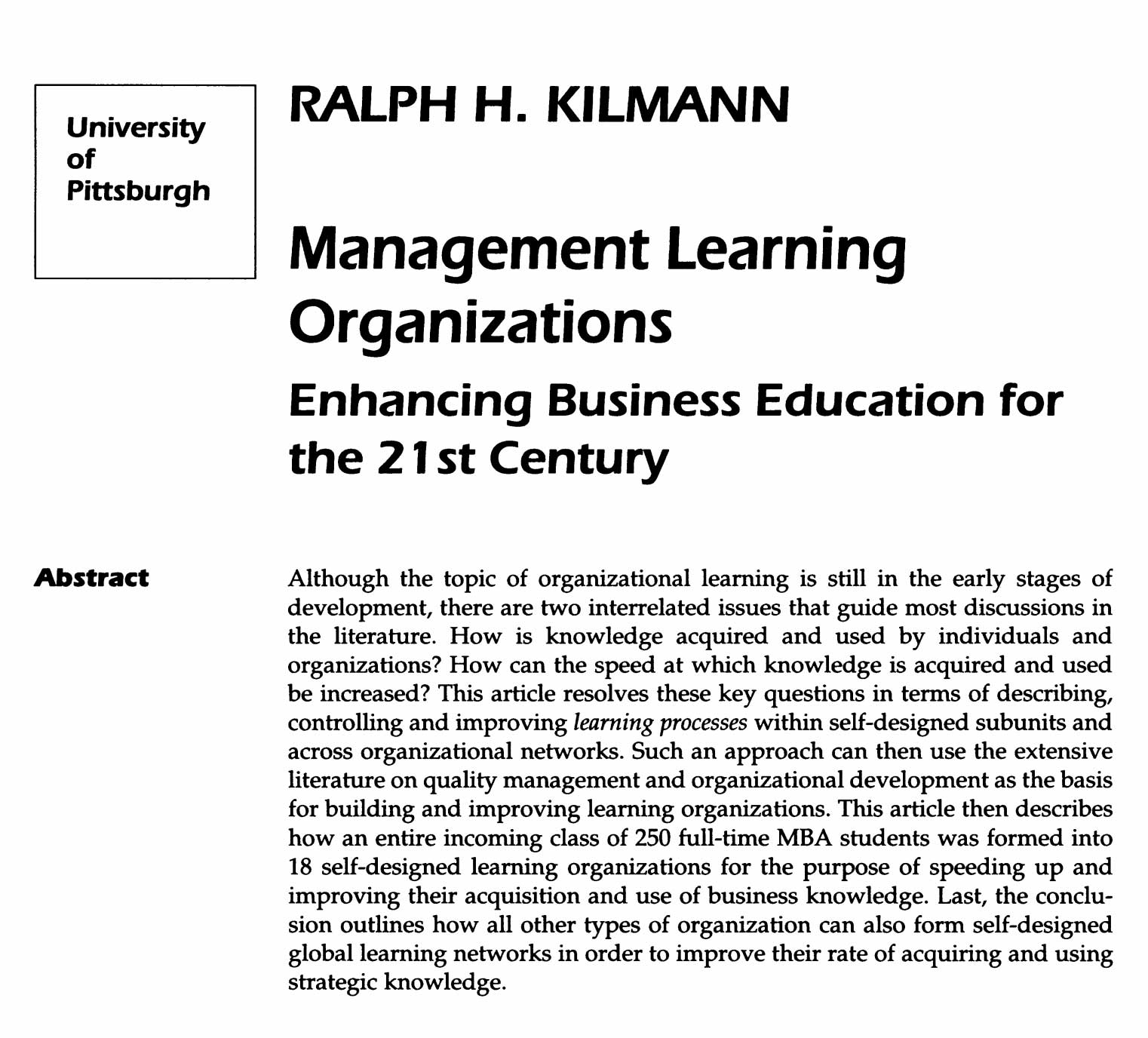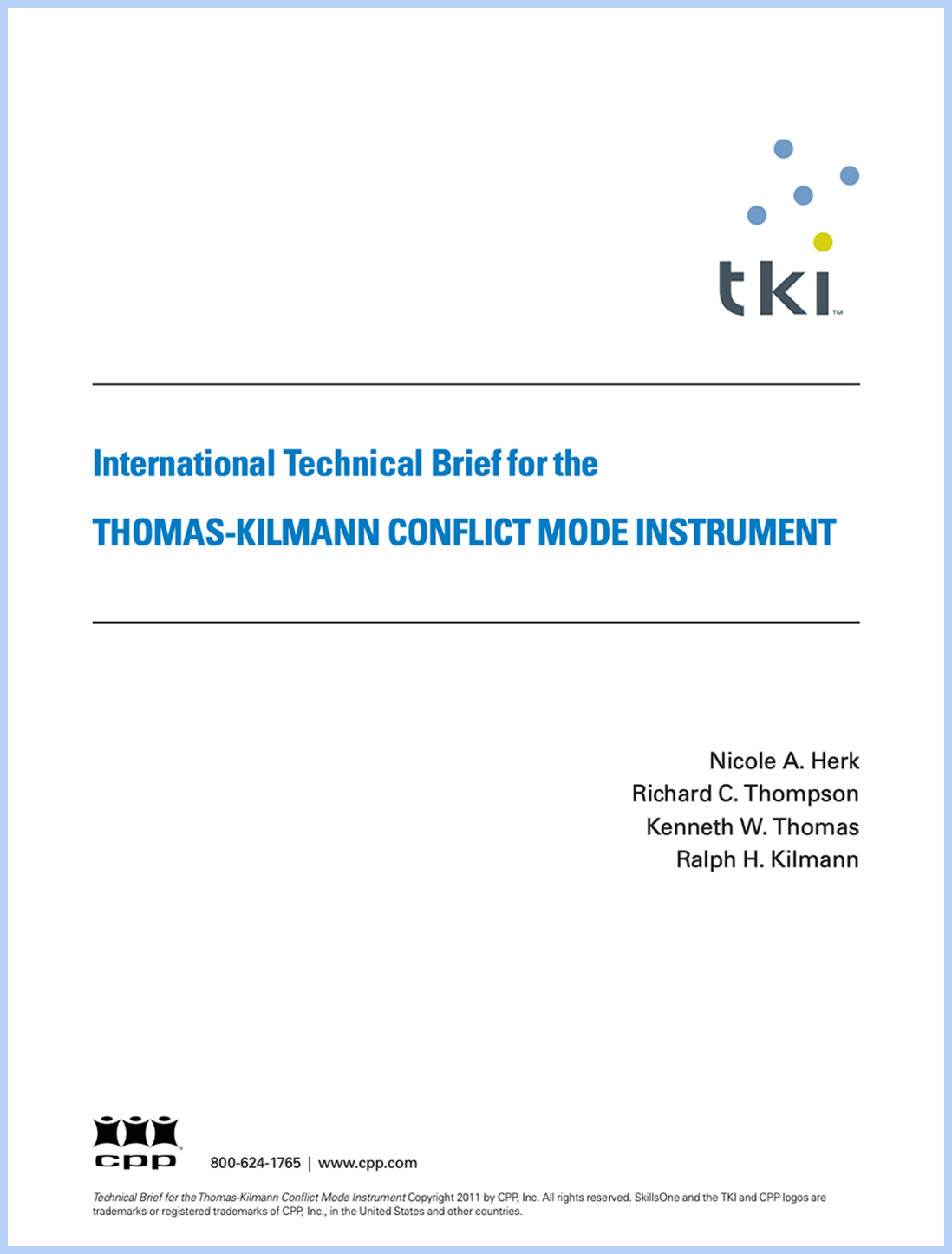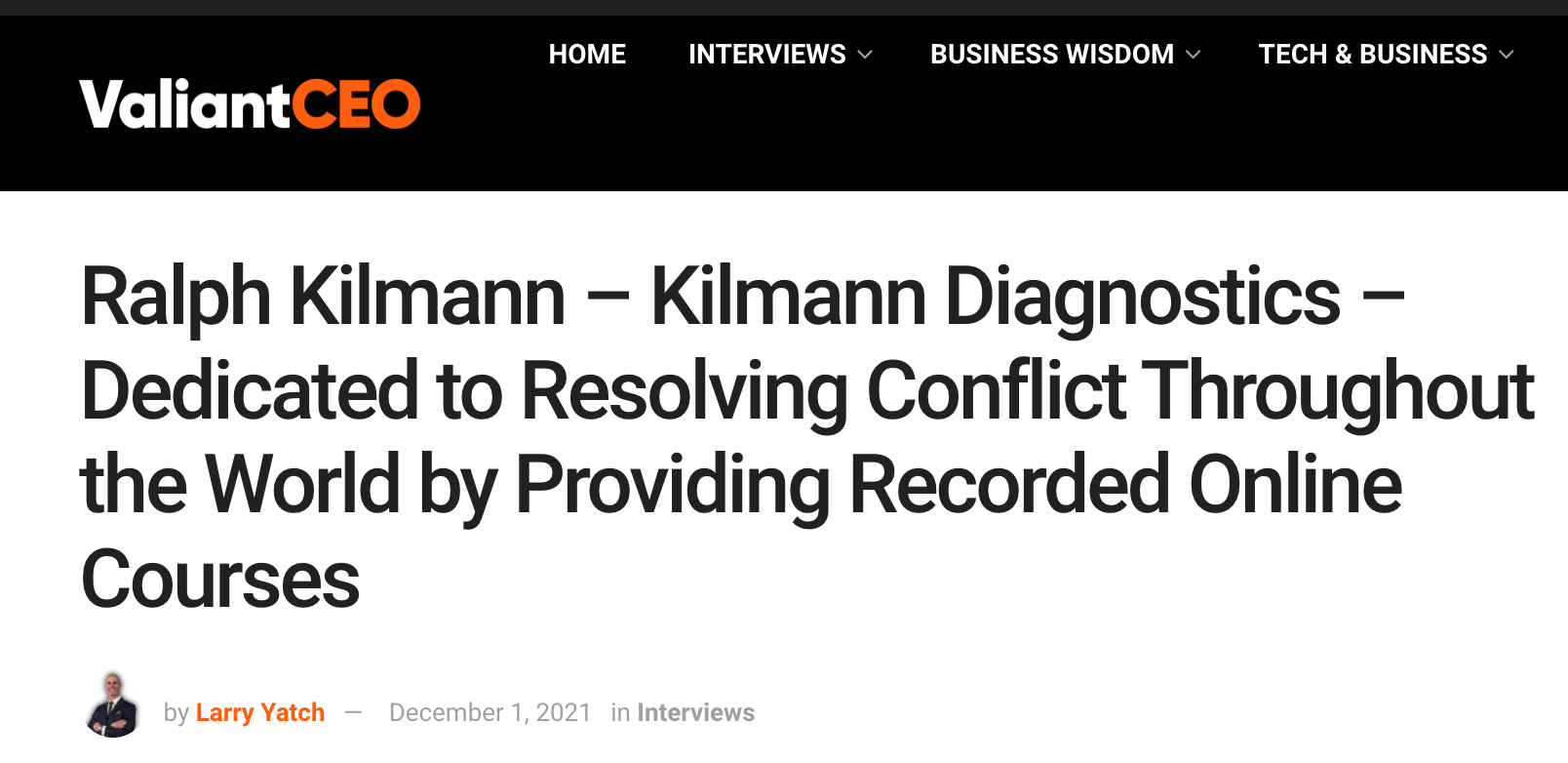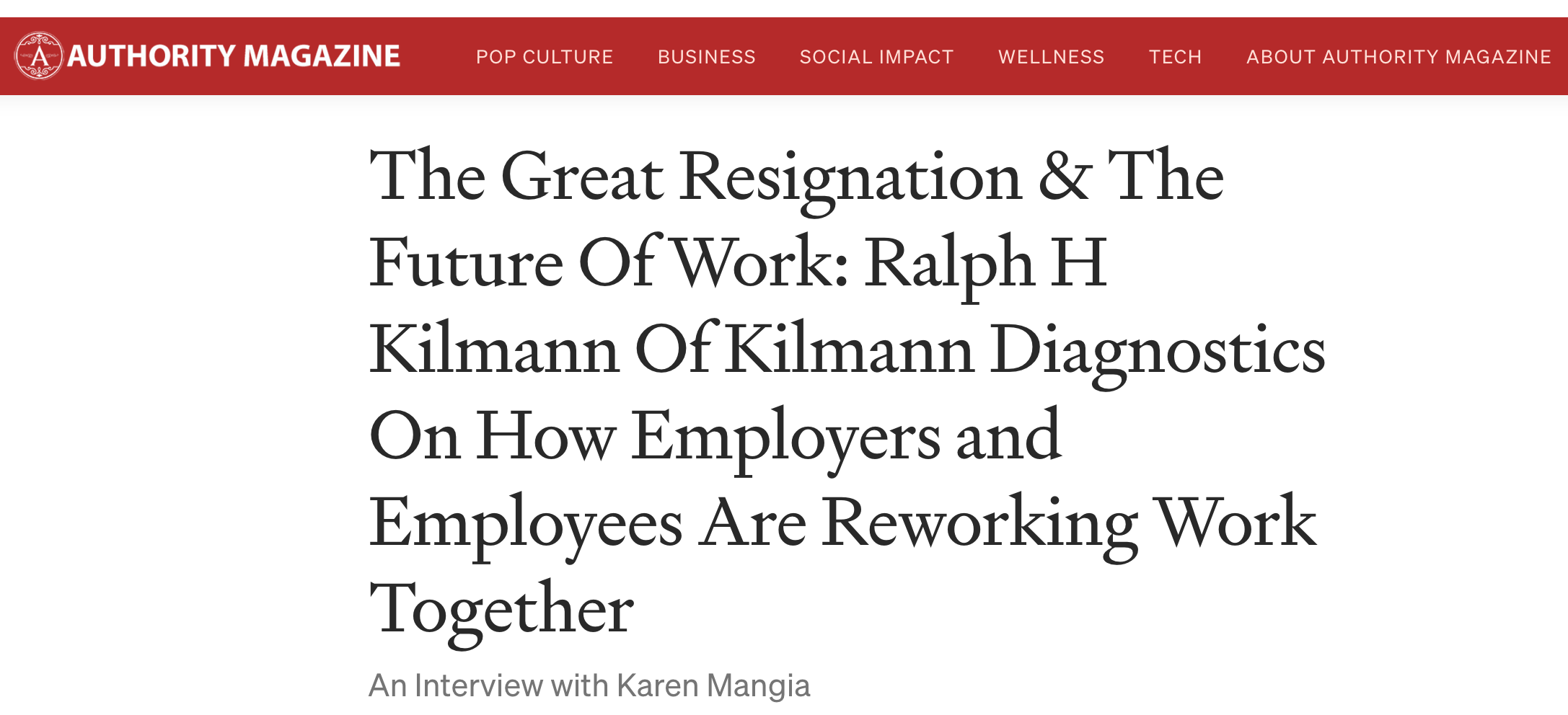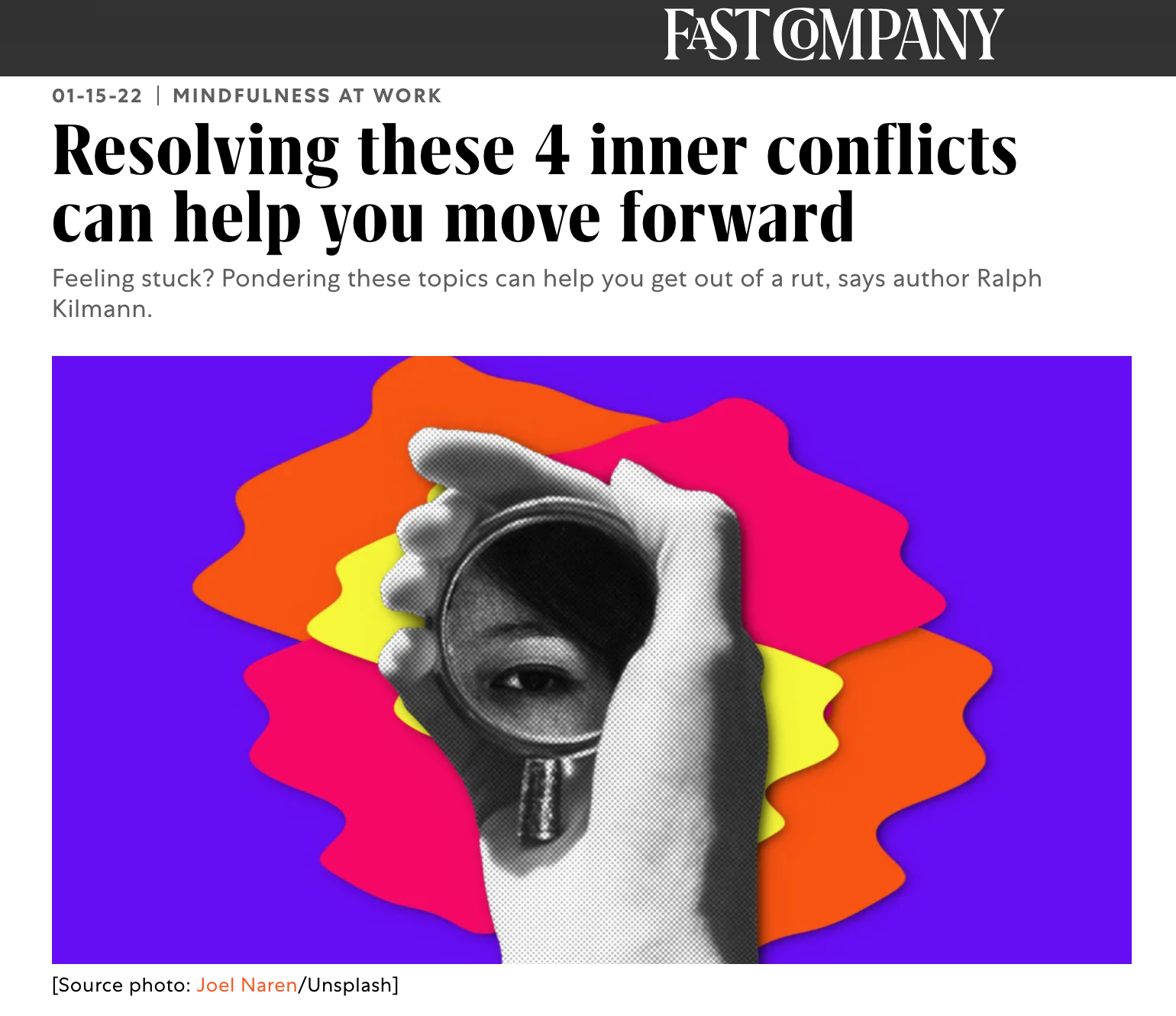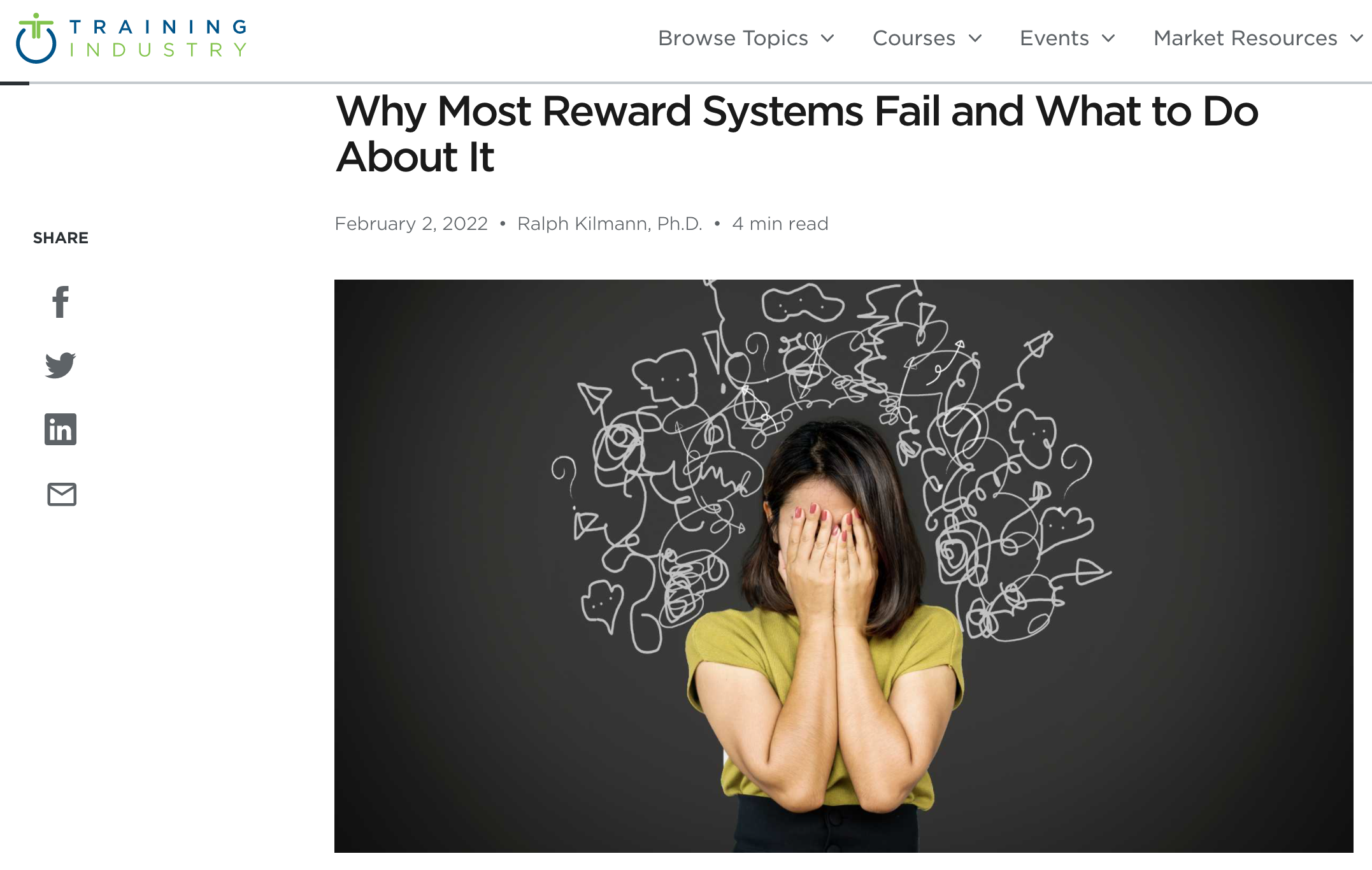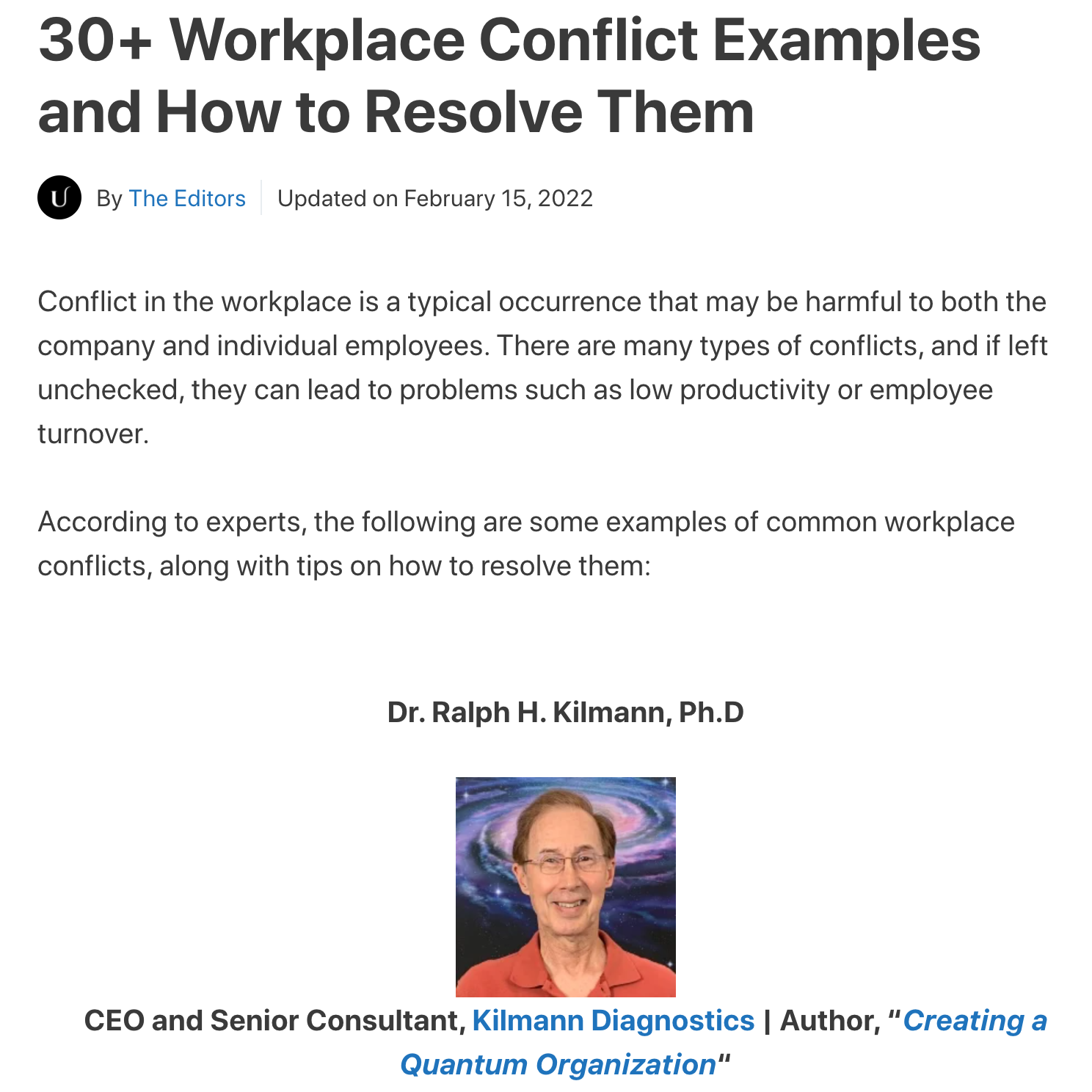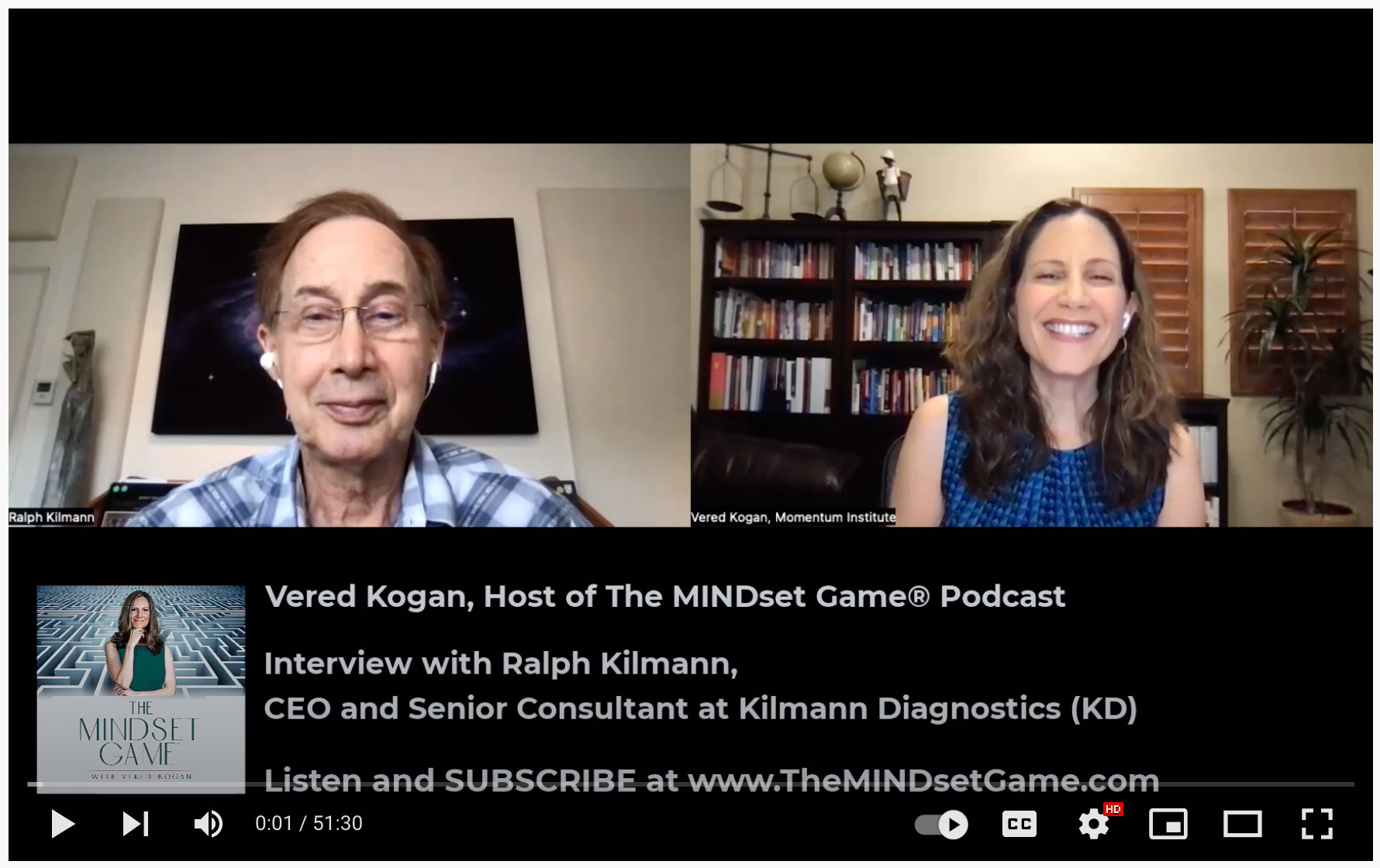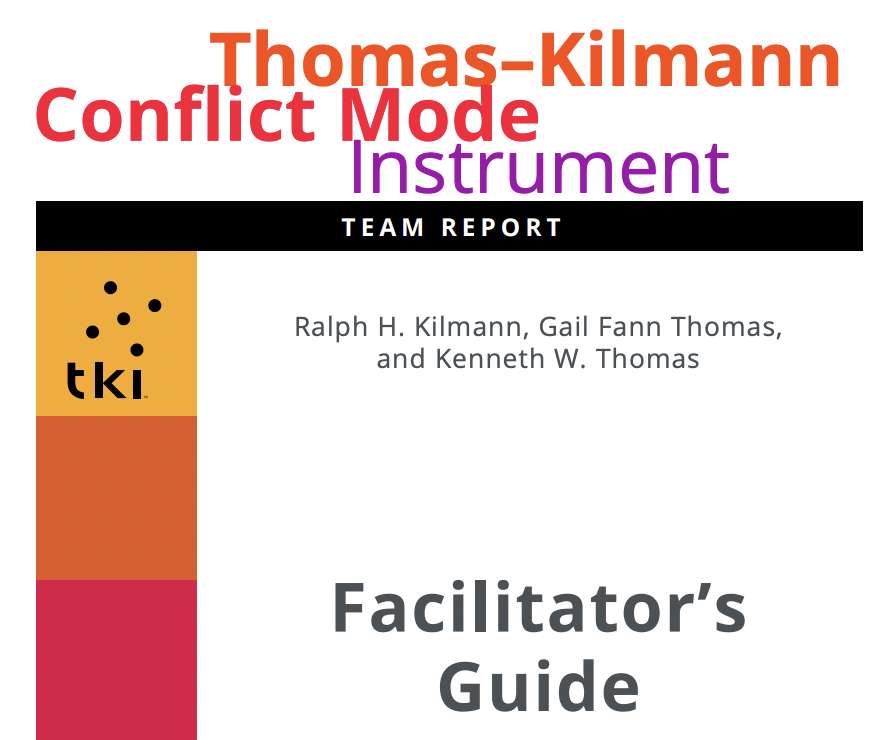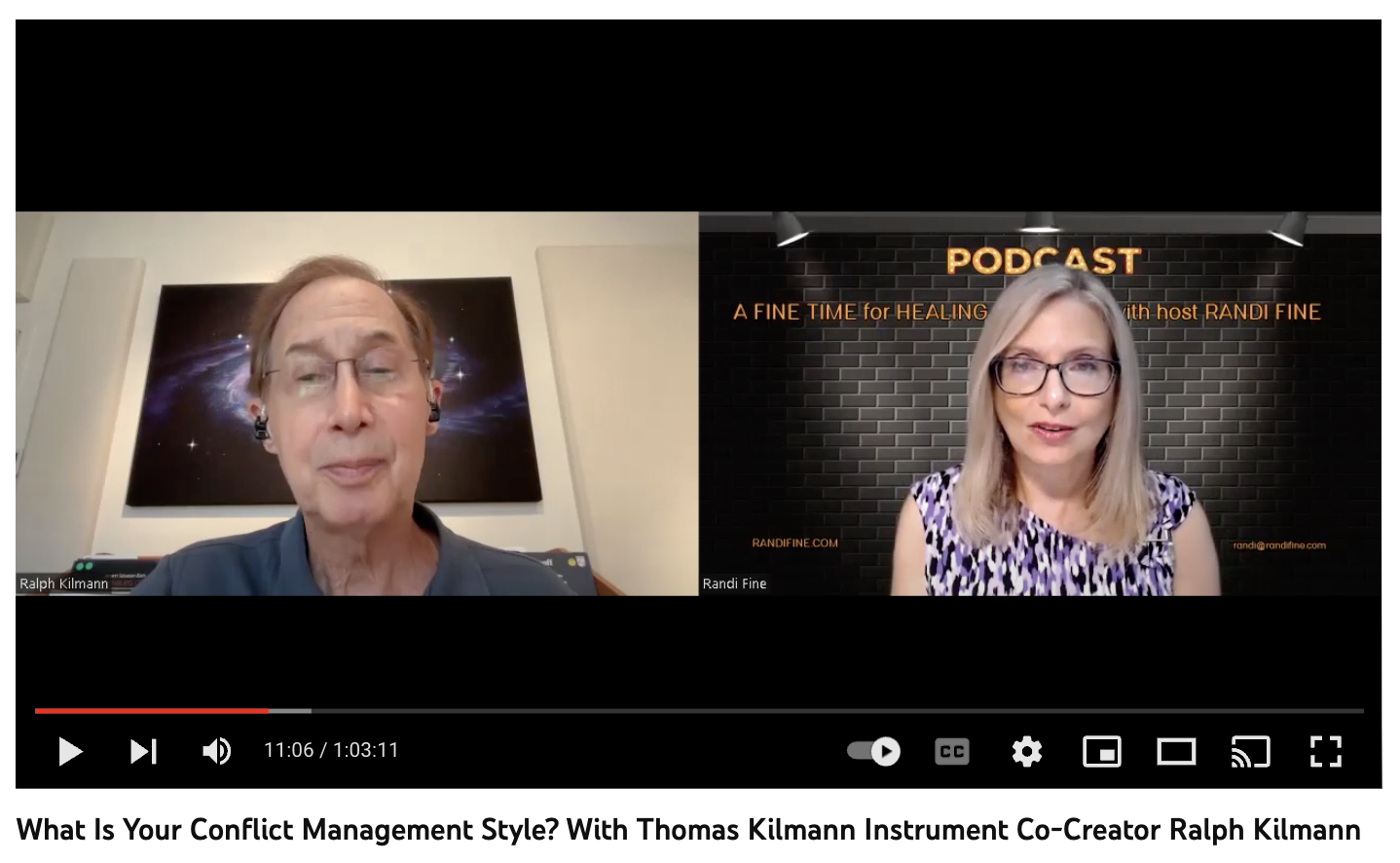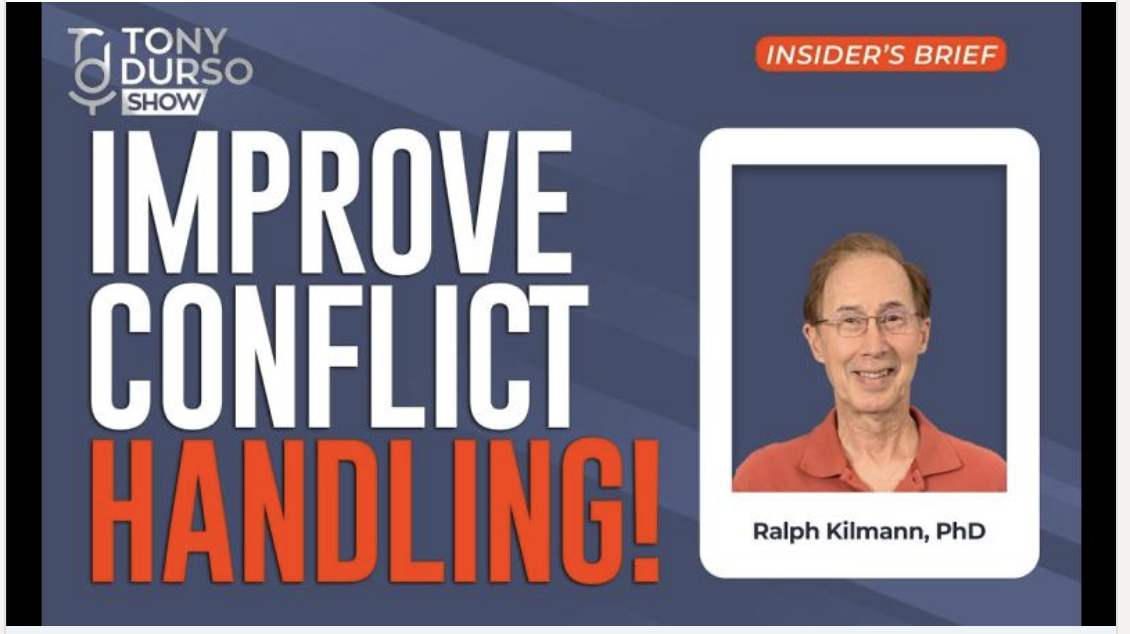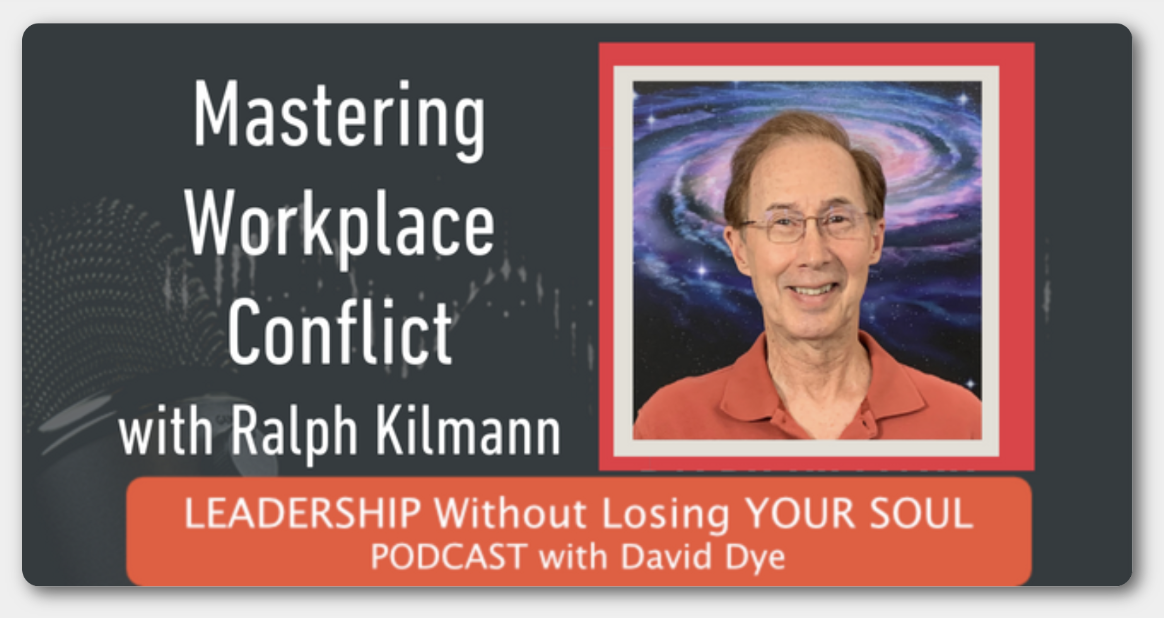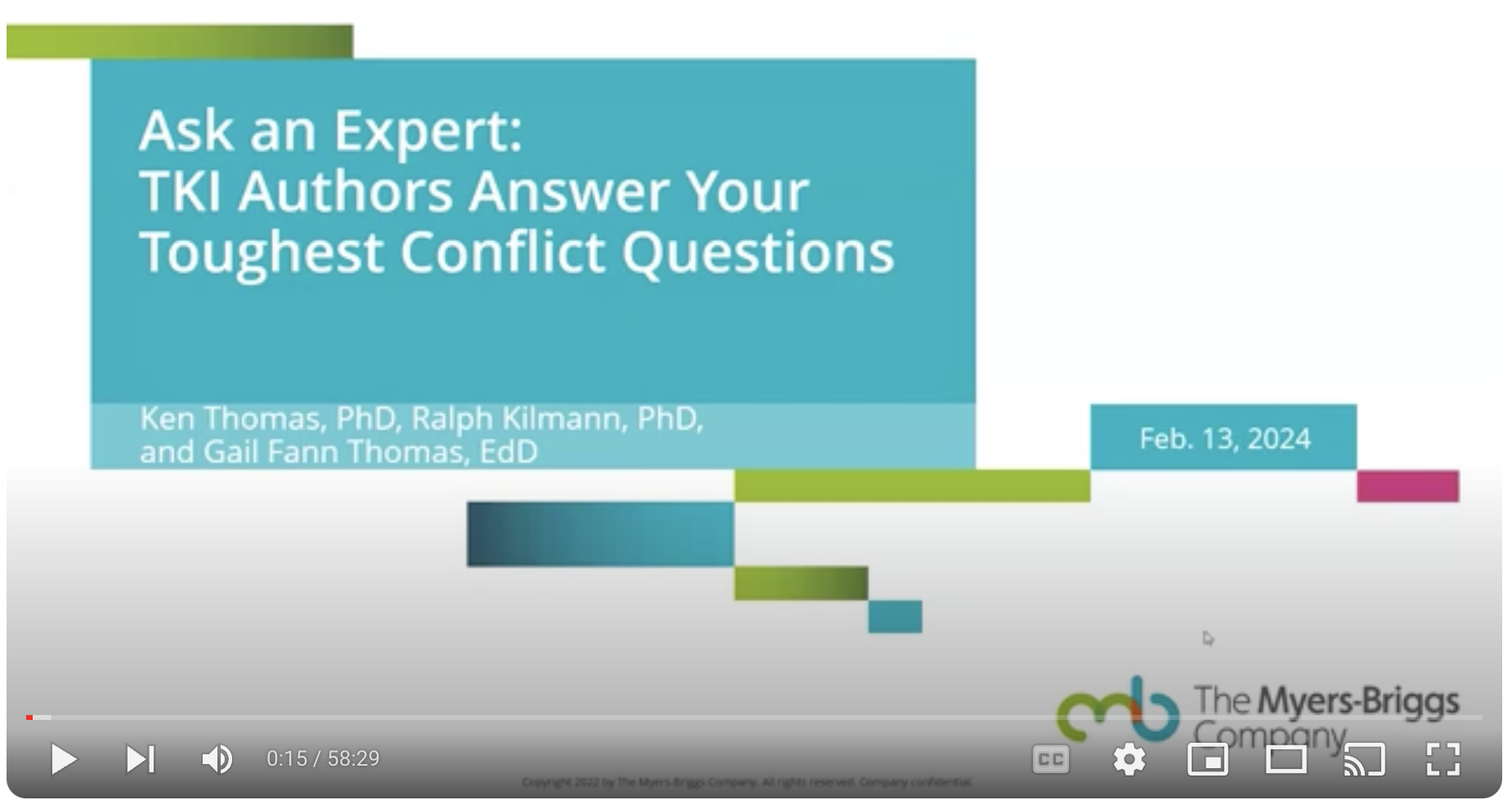- “Participative Multivariate Differentiation Toward Purposefulness, ” with Bill McKelvey, Proceedings of the Academy of Management (August 1973), 489-495.
- “The Effect of Interpersonal Values on Laboratory Training: An Empirical Investigation,” Human Relations, Vol. 27, No. 3 (1974), 247-265.
- “An Organic-Adaptive Organization: The MAPS Method.” Personnel, Vol. 51, No. 3 (1974), 35-47.
- “Participative Management in the College Classroom,” Journal of Applied Psychology, Vol. 59, No. 3 (1974), 337-338.
- “The MAPS Approach to Curriculum Innovation,” Proceedings of the Eastern Academy of Management (May 1974), unpaginated.
- “An Extension of the Risk-Shift Phenomenon to Achievement and Affiliation Concerns,” Psychological Reports, Vol. 35, No. 2 (1974), 845-846.
- “A Contingency Approach to Laboratory Learning: Psychological Types vs. Experiential Norms,” with Vern Taylor, Human Relations, Vol. 27, No. 9 (1974), 891-909.
- “A Scaled-Projective Measure of Interpersonal Values,” Journal of Personality Assessment, Vol. 39, No. 1 (1975), 34-40.
- “Developing a Comparative Measure of the Learning Climate in Professional Schools,” with Donald D. Bowen, Journal of Applied Psychology, Vol. 60, No. 1 (1975), 71-79.
- “Organization Design: A Participative Multivariate Approach,” with Bill McKelvey, Administrative Science Quarterly, Vol. 20, No. 1 (1975), 24-36.
- “Designing and Developing a ‘Real’ Organization in the Classroom,” Academy of Management Journal, Vol. 18, No. 1 (1975), 143-148.
- “A Quasi-Experimental Paradigm for Organizational Development: Intervention Strategies vs. Environmental Conditions,” Proceedings of the Eastern Academy of Management (April 1975), unpaginated.
- “The MAPS Route to Better Organization Design,” with Bill McKelvey, California Management Review, Vol. 17, No. 3 (1975), 23-31.
- “Stories Managers Tell: A New Tool for Organizational Problem Solving,” with Ian I. Mitroff, Management Review, Vol. 64, No. 7 (1975), 18-28. Reprinted in Downey, H. K., D. Hellriegel, and J. W. Slocum, Jr. (Eds.), Organizational Behavior: A Reader (St. Paul: West, 1977), 96-103. Reprinted in Leavitt, H. J., L. R. Pondy, and D. M. Boje (Eds.), Readings in Managerial Psychology, Third Edition (Chicago: University of Chicago, 1980), 666-676.
- “The Social Desirability Variable in Organizational Research: An Alternative Explanation for Reported Findings,” with Kenneth W. Thomas, Academy of Management Journal, Vol. 18, No. 4 (1975), 471-482.
- “Interpersonal Conflict-Handling Behavior as Reflections of Jungian Personality Dimensions,” with Kenneth W. Thomas, Psychological Reports, Vol. 37, No. 3 (1975), 971-980.
- “The Formation of Different Subgroups for Implementing MIS Designs via the MAPS Design Technology,” with Marjorie A. Lyles, Proceedings of the ASIS Annual Meeting, Vol. 12 (1975), 103-104.
- “On Evaluating Scientific Research: The Contributions of the Psychology of Science,” with Ian I. Mitroff, Technological Forecasting and Social Change, Vol. 8, No. 4 (1975), 163-174.
- “Qualitative Versus Quantitative Analysis for Management Science: Different Forms for Different Psychological Types,” with with Ian I. Mitroff, Interfaces, Vol. 6, No. 2 (1976), 17-28.
- “Patterns and Emerging Themes in Organization Design,” with Louis R. Pondy and Dennis P. Slevin, in Kilmann, R. H., et al. (Eds.), The Management of Organization Design: Volume I, Strategies and Implementation (New York: Elsevier North-Holland, 1976), 1-15.
- “On Organization Stories: An Approach to the Design and Analysis of Organizations Through Myths and Stories,” with Ian I. Mitroff, in Kilmann, R. H., et al. (Eds.), The Management of Organization Design: Volume I, Strategies and Implementation (New York: Elsevier North-Holland, 1976), 189-207.
- “MAPS as a Design Technology to Effectively Mobilize Resources for Social and Organization Problem Solving,” with the MAPS Group, in Kilmann, R. H., et al. (Eds.), The Management of Organization Design: Volume I, Strategies and Implementation (New York: Elsevier North-Holland, 1976), 251-294.
- “Directions of Research on Organization Design,” with Louis R. Pondy and Dennis P. Slevin, in Kilmann, R. H., et al. (Eds.), The Management of Organization Design: Volume II, Research and Methodology (New York: Elsevier North-Holland, 1976), 1-30.
- “Towards a Systemic Methodology for Evaluating the Impact of Interventions on Organizational Effectiveness,” with Richard P. Herden, Academy of Management Review,Vol. 1, No. 3 (1976), 87-98.
- “An Experimental Test of Organization Design Theory and the MAPS Design Technology: Homogeneous Versus Heterogeneous Composition of Organizational Subsystems,” with Joseph Seltzer, Proceedings of the Eastern Academy of Management (May 1976), 93-97.
- “The MAPS Design Technology: Designing Strategic Intelligence Systems for Multinational Corporations,” with Kyung-Il Ghymn, Columbia Journal of World Business,Vol. 11, No. 2 (1976), 35-47.
- “Confronting the Problem of Sexism in Organizations: Structural-Humanistic Versus Legal-Coercive Efforts at Change,” with Jyotsna M. Sanzgiri, Proceedings of the Academy of Management (August 1976), 296-300.
- “Designing an Effective Problem Solving Organization with the MAPS Design Technology,” with Ian I. Mitroff and Marjorie A. Lyles, Journal of Management, Vol. 2, No. 2 (1976), 1-10.
- “Systemic Knowledge: An Integrated Program of Research on Science,” with Ian I. Mitroff, Theory and Society, Vol. 4, No. 1 (1977), 103-129.
- “Developing a Forced-Choice Measure of Conflict-Handling Behavior: The MODE Instrument,” with Kenneth W. Thomas, Educational and Psychological Measurement,Vol. 37, No. 2 (1977), 309-325.
- “Teaching Managers To Do Policy Analysis: The Case of Corporate Bribery,” with Ian I. Mitroff, California Management Review, Vol. 20, No. 1 (1977), 47-54.
- “The Effect of Organization Design on Intra- Personal, Intra-Group, and Inter-Group Conflict: An Experimental Study with the MAPS Design Technology,” with Afzalur Rahim, Proceedings of the Eastern Academy of Management (May 1977), 67-71.
- “Designing Strategic Intelligence Systems for Multinational Corporations via the MAPS Design Technology: Theoretical and Empirical Perspectives,” with Kyung Il Ghymn, Organization and Administrative Sciences, Vol. 8, No. 3 (1977), 311-323. Reprinted in Burack, E. H., and A. R. Negandhi (Eds.), Organization Design: Theoretical Perspectives and Empirical Findings (Kent, OH: Comparative Administration Research Institute, 1977), 311-323.
- “Effect of Group Composition on Group Process: Homogeneity versus Heterogeneity on Task and People Dimensions,” with Joseph Seltzer, Psychological Reports, Vol. 41, No. 3 (1977), 1195-1200.
- “A New Perspective on the Consulting/Intervention Process: Problem Defining vs. Problem Solving,” with Ian I. Mitroff, Proceedings of the Academy of Management(August 1977), 148-152. Reprinted in Gore, G. J., and R. G. Wright (Eds.), The Academic/Consultant Connection (Dubuque, Iowa: Kendall/Hunt, 1979), 71-80.
- “The Application of Behavioral and Philosophical Technologies to Strategic Planning: A Case Study with a Large Federal Agency,” with Ian I. Mitroff and Vincent P. Barabba, Management Science, Vol. 24, No. 1 (1977), 44-58.
- “Four Perspectives on Conflict Management: An Attributional Framework for Organizing Descriptive and Normative Theory,” with Kenneth W. Thomas, Academy of Management Review, Vol. 3, No. 1 (1978), 59-68. Reprinted in Kelly, J., and V. V. Baba (Eds.), The New Management Scene (Englewood Cliffs, NJ: Prentice-Hall, 1982), 180-191.
- “Designing Scientific Journals: Issues and Survey Results,” with William R. King and Kenneth Sochats, Management Science, Vol. 24, No. 1 (1978), 774-784.
- “On Integrating Behavioral and Philosophical Systems: Toward a Unified Theory of Problem Solving,” with Ian I. Mitroff, in Jones, R. A. (Ed.), Research in Sociology of Knowledge, Sciences and Art: Volume 1 (Greenwich, CT: JAI, 1978), 207-236.
- “The Role of Idealization in Long Range Planning: An Essay on the Logical and Social-Emotional Aspects of Planning,” with Ian I. Mitroff and James R. Emshoff, Technological Forecasting and Social Change, Vol. II, No. 4 (1978), 335-348.
- “Comparison of Four Instruments Measuring Conflict Behavior,” with Kenneth W. Thomas, Psychological Reports, Vol. 42, No. 3 (1978), 1139-1145.
- “Behavioral Science Technologies for Strategic Planning and Policy Analysis,” with Ian I. Mitroff, Proceedings of the Eastern Academy of Management (May 1978), 107-108.
- “Laboratory Simulations with the MAPS Design Technology: The Effect of Subsystem Composition on Organizational Effectiveness,” with Joseph Seltzer, Proceedings of the Southern Management Association (November 1978), 139-141.
- “Problem Management: A Behavioral Science Approach,” in Zaltman G. (Ed.), Management Principles for Nonprofit Agencies and Organizations (New York: American Management Association, 1979), 213-255.
- “Avoiding the Design of Management Misinformation Systems: A Strategic Approach,” with Ian I. Mitroff and Vincent P. Barabba, in Zaltman, G. (Ed.), Management Principles for Nonprofit Agencies and Organizations (New York: American Management Association, 1979), 401-429.
- “On Integrating Knowledge Utilization with Knowledge Development: The Philosophy Behind the MAPS Design Technology,” Academy of Management Review, Vol. 4, No. 3 (1979), 417-426. Reprinted in Projektowanie I Systemy, Warszawa, Poland, Vol. VII (1985), 77-93.
- “Assumptional Analysis: A Methodology for Strategic Problem Solving,” with Ian I. Mitroff and James R. Emshoff, Management Science, Vol. 25, No. 6 (1979), 583-593. Reprinted in Datta, L., and R. Perloff (Eds.), Improving Evaluations (Beverly Hills: Sage, 1979), 208-225.
- “On Analyzing Survey Data for Journal Design,” with William R. King and Kenneth Sochats, Management Science, Vol. 25, No. 3 (1979), 296-298.
- “Integrating the Benefits of Different Efforts at Management Consulting: The Case of Human Resources, Organization Development, and Organization Design,” with Thomas J. Benecki and Yitzchak M. Shkop, in Gore, G. J., and R. G. Wright (Eds.), The Academic/Consultant Connection (Dubuque, Iowa: Kendall/Hunt, 1979), 215-226.
- “Problem Defining and the Consulting/Intervention Process,” with with Ian I. Mitroff, California Management Review, Vol. 21, No. 3 (1979), 26-33.
- “New Developments and Applications of the MAPS Design Technology,” Proceedings of the Eastern Academy of Management (May 1980), 153-155.
- “Improving Productivity Through Organization Design: Developing Conceptual and Methodological Linkages,” Proceedings of the Southern Management Association(November 1980), 123-125.
- “The Four-Fold Way of Knowing: The Varieties of Social Science Experience,” with Ian I. Mitroff, Theory and Society, Vol. 10, No. 2 (1981), 227-248.
- “Organization Design for Knowledge Utilization,” Knowledge: Creation, Diffusion, Utilization, Vol. 3, No. 2 (1981), 211-231.
- “Toward a Unique/Useful Concept of Values for Interpersonal Behavior: A Critical Review of the Literature on Value,” Psychological Reports, Vol. 48, No. 3 (1981), 939-959.
- “The Use of Problem Defining Groups for Better OD Diagnosis: Alternatives and Consequences,” Proceedings of the Eastern Academy of Management (May 1981), 203-207.
- “Methodological Approaches to Social Science,” with Ian I. Mitroff, in Reason, P. and Rowan, J. (Eds.), Human Inquiry (New York: Wiley, 1981), 43-51.
- “Review of Organization Change and Development: A Systems View by Michael Beer,” Academy of Management Review, Vol. 7, No. 2 (1982), 315-317.
- “The Emergence of Four Types of Productivity: One Approach Can’t Work Without the Others,” with Robert D. Russell, Proceedings of the Eastern Academy of Management(May 1982), 51-54.
- “Designing Collateral Organizations,” Human Systems Management, Vol. 3, No. 2 (1982), 66-76.
- “Getting Control of the Corporate Culture,” Managing, No. 3 (1982), 11-17. Reprinted in NonProfit World Report, Vol. 3, No. 2 (March-April 1985), 12-15.
- “A Dialectical Approach to Formulating and Testing Social Science Theories: Assumptional Analysis,” Human Relations, Vol. 36, No. 1 (1983), 1-22.
- “The Costs of Organization Structure: Dispelling the Myths of Independent Divisions and Organization-Wide Decision Making,” Accounting, Organizations and Society, Vol. 8, No. 4 (1983), 341-357.
- “A Typology of Organization Typologies: Toward Parsimony and Integration in the Organizational Sciences,” Human Relations, Vol. 36, No. 6 (1983), 523-548.
- “The Problem of Producing Useful Knowledge,” with Dennis P. Slevin and Kenneth W. Thomas, in Kilmann, R. H., et al. (Eds.), Producing Useful Knowledge for Organizations (New York: Praeger, 1983), 1-21.
- “Where Have the Organizational Sciences Gone? A Survey of the Academy of Management Membership,” with Kenneth W. Thomas, in Kilmann, R. H., et al. (Eds.), Producing Useful Knowledge for Organizations (New York: Praeger, 1983), 69-81.
- “Intellectual Resistance to Useful Knowledge: An Archetypal Social Analysis,” with Ian I. Mitroff, in Kilmann, R. H., et al. (Eds.), Producing Useful Knowledge for Organizations(New York: Praeger, 1983), 266-280.
- “The Thomas-Kilmann Conflict Mode Instrument,” with Kenneth W. Thomas, in Cole, D. W. (Ed.), Conflict Resolution Technology (Cleveland, OH: The Organizational Development Institute, 1983), 57-64.
- “Understanding Matrix Organization: Keeping the Dialectic Alive and Well,” in Warrick, D. D., (Ed.), Contemporary Organization Development: Current Thinking and Applications(Glenview, IL: Scott, Foresman, 1984), 152-165.
- “Corporate Tragedies: Teaching Companies to Cope with Evil,” with Ian I. Mitroff, New Management, Vol. 1, No. 4 (1984), 48-53.
- “Five Steps to Culture Change: Vultures vs. Beavers,” New Management, Vol. 2, No. 1 (1984), 20-21. Reprinted in St. Paul Pioneer Press/Dispatch, “Corporate Beavers Can Route Out Culture Vultures,” (July 9, 1984), 3. Reprinted in National Forum on Human Resources Planning for Private Sector and Defense Leaders (Washington DC: Syllogistics, May 1986), unpaginated.
- “Beyond The Quick Fix: Why Managers Must Disregard the Myth of Simplicity as a Direct Route to Organizational Success,” Management Review, Vol. 73, No. 11 (November 1984), 24-28, 37. Reprinted in Managing, No. 2 (1984), 10-15. Reprinted in Administrative Radiology, Vol. 4, No. 6 (1985), 26-32. Reprinted in Executive Excellence(November 1986), 10-11.
- “Measuring A Company’s Culture-Gap: Pinpointing the Directions for Cultural Change,” with Mary J. Saxton, The Human Resources Planning Newsletter, Vol. 6, No. 1 (1985), 1-2.
- “Corporate Culture: Managing the Intangible Style of Corporate Life May Be the Key to Avoiding Stagnation,” Psychology Today, Vol. 19, No. 4 (April 1985), 62-68. Reprinted in Current, No. 274 (1985), 7-12. Reprinted in Ivancevich, J. M., and M. T. Matteson (Eds.), Organizational Behavior and Management (Third Edition) (Plano, Texas: Business Publications, 1987), 41-46. Reprinted in The International Management Development Review, Vol. 3 (1987), 96-100.
- “Response and Commentary on ‘Doing Research That Makes a Difference’ by J. Richard Hackman,” in Lawler, E. E. et. al., Doing Research That Is Useful for Theory and Practice(San Francisco: Jossey-Bass, 1985), 149-155.
- “Managing Troublemakers,” Training and Development Journal, Vol. 39, No. 5 (1985), 102-107.
- “Companies Must Design Mechanisms to Cope with Unforeseen Disaster,” with Ian I. Mitroff, The Los Angeles Times (April 28, 1985), 3.
- “Introduction: Five Key Issues in Understanding and Changing Culture,” with Mary J. Saxton and Roy Serpa, in Kilmann, R. H., et al., Gaining Control of the Corporate Culture(San Francisco: Jossey-Bass, 1985), 1-16.
- “Corporate Taboos as the Key to Unlocking Culture,” with Ian I. Mitroff, in Kilmann, R. H., et al., Gaining Control of the Corporate Culture (San Francisco: Jossey-Bass, 1985), 184-199.
- “Five Steps for Closing Culture-Gaps,” in Kilmann, R. H., et al., Gaining Control of the Corporate Culture (San Francisco: Jossey-Bass, 1985), 351-369. Reprinted in Mec-Rastor Ryhma Toimintakertomus 1984-1985, Espoo, Finland (1985), 7-12. Reprinted in Shield and Diamond, Vol. 96, No. 4 (1985), 10-19.
- “Conclusion: Why Culture Is Not Just a Fad,” with Mary J. Saxton and Roy Serpa, in Kilmann, R. H., et al., Gaining Control of the Corporate Culture (San Francisco: Jossey-Bass, 1985), 421-433.
- “Why Corporate Disasters Are on the Increase, and How Companies Can Cope With Them,” with Ian I. Mitroff, Public Affairs Review, Vol. VI (1985), 5-21.
- “Managing All Barriers to Organizational Success,” Training and Development Journal,Vol. 39, No. 9 (1985), 64-72.
- “Will Bhopal Happen Again?” with Ian I. Mitroff, Management Review (September 1985), 61-62.
- “A Complete Program for Organizational Success,” Consultation, Vol. 4, No. 4 (1985), 316-330.
- “Issues in Understanding and Changing Culture,” with Mary J. Saxton and Roy Serpa, California Management Review, Vol. 28, No. 2 (1986), 87-94.
- “Introduction: Key Themes in Corporate Transformation,” with Teresa Joyce Covin, in Kilmann, R. H., et al., Corporate Transformation: Revitalizing Organizations for a Competitive World (San Francisco: Jossey-Bass, 1988), 1-13.
- “Towards a Complete Program for Corporate Transformation,” in Kilmann, R. H., et al., Corporate Transformation: Revitalizing Organizations for a Competitive World (San Francisco: Jossey-Bass, 1988), 302-329. Reprinted in Mohrman, A. M., Jr., et al., Large-Scale Organizational Change (San Francisco: Jossey-Bass, 1989), 200-228.
- “Conclusion: New Directions in Corporate Transformation,” with Teresa Joyce Covin, in Kilmann, R. H., et al., Corporate Transformation: Revitalizing Organizations for a Competitive World (San Francisco: Jossey-Bass, 1988), 523-538.
- “Change at the Top,” Strategic Direction, No. 30 (April 1988), 23-24.
- “Paradoxical Interventions for Top Managers and Troublemakers,” in Quinn, R. E., and K. S. Cameron (Eds.), Paradox and Transformation: Toward a Theory of Change in Organization and Management (Cambridge: Ballinger, 1988), 229-235.
- “Management of Corporate Culture,” in Fottler, M. D., S. R. Hernandez, and C. L. Joiner (Eds.), Strategic Management of Human Resources in Health Services Organizations(New York: Wiley, 1988), 206-218.
- “Occupational Frame of Reference and the Identification of Critical Issues in Large-Scale Change Efforts,” with Teresa Joyce Covin, Consultation, Vol. 7, No. 3 (1988), 174-186.
- “Critical Issues in Large-Scale Change,” with Teresa Joyce Covin, Journal of Organizational Change Management, Vol. 1, No. 2 (1988), 59-72.
- “A Completely Integrated Program for Creating and Maintaining Organizational Success,”Organizational Dynamics (Summer 1989), 4-19. Reprinted in QPM: Quality and Productivity Management, Vol. 8, No. 1 (1990), 3-16.
- “21st Century Management: Tomorrow’s Company Won’t Have Walls,” The New York Times, Section F (June 18, 1989), 3.
- “Top Management: Facing Up to the Company Troublemaker,” Business Month (June 1989), 85, 88.
- “Leadership: The Perfectly Competitive Company,” PC/Computing (November 1989), 128-133.
- “Participant Perceptions of Positive and Negative Influences on Large-Scale Change,” with Teresa Joyce Covin, Group and Organization Studies, Vol. 15, No. 2 (1990), 233-248.
- “Implementation of Large-Scale Planned Change: Some Areas of Agreement and Disagreement,” with Teresa Joyce Covin, Psychological Reports, Vol. 66 (1990), 1235-1241.
- “Holistic Improvement at Eastman Kodak: Implementing a Completely Integrated Program,” Consultation, Vol. 9, No. 1 (1990), 5-36.
- “The Secrets of Successful Continuous Change,” Boardroom Reports, Vol. 19, No. 23 (1990), 9-10.
- “A Networked Company That Embraces the World,” Information Strategy: The Executive’s Journal, Spring 1990, 23-26.
- “Introduction: Key Themes in Making Organizations Competitive,” in Kilmann, R. H., et al., Making Organizations Competitive: Enhancing Networks and Relationships Across Traditional Boundaries (San Francisco: Jossey-Bass, 1991), 1-18.
- “Integrating Different Approaches for Achieving Competitiveness,” with Joyce Shelleman and Brian Uzzi, in Kilmann, R. H., et al., Making Organizations Competitive: Enhancing Networks and Relationships Across Traditional Boundaries (San Francisco: Jossey-Bass, 1991), 108-126.
- “Conclusion: Creating the Perfectly Competitive Organization,” in Kilmann, R. H., et al., Making Organizations Competitive: Enhancing Networks and Relationships Across Traditional Boundaries (San Francisco: Jossey-Bass, 1991), 434-455.
- “The Context of Decision Making in Organizations: A Factor Analysis,” with Larry W. Boone, in Meindl, J. R., R. L. Cardy, and S. M. Puffer (Eds.), Advances in Information Processing in Organizations: Volume 4 – 1991 (Greenwich, CT: JAI, 1991), 147-160.
- “Profiling Large-Scale Change Efforts,” with Teresa Joyce Covin, Organization Development Journal, Vol. 9, No. 2 (1991), 1-8.
- “Review of Transforming Organizations by Thomas A. Kochan and Michael Useem (Editors),” Academy of Management Review, Vol. 18. No. 1 (1993), 156-160.
- “Achieving Organizational Success: Implementing the Five Tracks,” New Designs for Youth Development, Vol. 10, No. 4 (1993), 9-13.
- “Managing Holistic Improvement: A Completely Integrated Program for Creating and Sustaining Organizational Success,” Clinical Laboratory Management Review, Vol. 7, No. 5 (1993), 395-397, 400-403, 406.
- “Why Total Quality Management Fails and What Can Be Done About It.” Managing, No. 7 (Fall 1993), 6-9.
- “Introduction: The Personal Struggle for Identity, Competency, Value, Worth, and Responsibility,” with the Ego Energy Group, in Kilmann, R. H., et al., Managing Ego Energy: The Transformation of Personal Meaning into Organizational Success (San Francisco: Jossey-Bass, 1994), 1-24.
- “Conclusion: Improving the Self Through Total Quality Management,” in Kilmann, R. H., et al., Managing Ego Energy: The Transformation of Personal Meaning into Organizational Success (San Francisco: Jossey-Bass, 1994), 306-330.
- “Using Organizational Stories for the Diagnostic Phase of Planned Change: Some Possibilities and Precautions,” with Teresa Joyce Covin and Ines Kilmann, Psychological Reports, Vol. 74 (1994), 623-634.
- “Support Workers During Changes,” Pittsburgh Post Gazette (Sunday, May 7, 1995), Section F, 1.
- “A Holistic Program and Critical Success Factors of Corporate Transformation,” European Management Journal, Vol. 13, No. 2 (1995), 175-186.
- “Management Learning Organizations: Enhancing Business Education for the Twenty-First Century,” Management Learning, Vol. 27, No. 2 (1996), 203-237.
- “Profiling Large-Scale Change Efforts,” with Teresa Joyce, Organizational Development Journal, Volume 17, No. 2 (1999), 71-80. (Note: This article was published in a special issue that selected the 7 best articles published in that journal during the past 16 years.)
- “The Role of the Reward System for a Total Quality Management-Based Strategy,” with Richard S. Allen, Journal of Organizational Change Management, Vol. 14, No. 2 (2001), 110-131.
- “How Well Does Your Reward System Support TQM?” with Richard S. Allen, Quality Progress, Vol. 34, No. 4 (2001), 52-57.
- “Aligning Reward Practices in Support of Total Quality Management,” with Richard S. Allen, Business Horizons (May-June 2001), 77-84.
- “Confronting Culture Gaps in Your Organization,” Employers Group, Vol. 51 (August/ September 2001), 1, 12-13.
- “Leadership and the Quantum Organization,” Integral Leadership Review, Vol. 1 (2007), 32–43.
- “Developing and Validating a Quantitative Measure of Organizational Courage,” with Linda A. O’Hara and Judy P. Strauss, Journal of Business and Psychology, Vol. 25, No. 1 (2010), 15–23. Reprinted in Burke, R. J. and C. L. Cooper (Eds.), Voice and Whistleblowing in Organizations: Overcoming Fear, Fostering Courage, and Unleashing Candour (Cheltenham, U.K.: Edward Elgar, 2013), 311–342.
- “Celebrating 40 Years with the TKI Assessment: A Summary of My Favorite Insights,” CPP Insider Newsletter, May 2011.
- “International Technical Brief for the Thomas-Kilmann Conflict Mode Instrument,” with Nicole A. Herk, Richard C. Thompson, and Kenneth W. Thomas (Mountain View, CA: CPP, Inc., 2011).
- “Thomas-Kilmann Conflict Mode Instrument with Dr. Ralph Kilmann (Kilmann Diagnostics).” Podcast with Dave Hilton, Conflict Specialists Show (April 9, 2013).
- “The Evolution and Purpose of the Kilmann Organizational Conflict Instrument (KOCI)” (Newport Coast, CA: Kilmann Diagnostics, 2020).
- “Expanding Consciousness,” Podinar with Alison Whitmire, Heal the Divide (October 21, 2020).
- “Creating and Maintaining a Supportive Company Culture.” Interview with Larry Yatch, ValiantCEO (November 4, 2021).
- “The Great Resignation & the Future of Work.” Interview with Karen Mangia, Authority Magazine (December 22, 2021).
- “Resolving These Four Inner Conflicts Can Help You Move Forward.” Interview with Stephanie Vozza, Fast Company (January 15, 2022).
- “Why Most Reward Systems Fail and What to Do About It.” Training Industry (February 2, 2022).
- “Addressing Workplace Conflict with the Thomas-Kilmann Conflict Model.” Up Journey (February 14, 2022).
- “Thomas-Kilmann Instrument (TKI) and the Kilmann Organizational Conflict Instrument (KOCI),” in L. Wilkin and Y. Pathak (Eds.), De Gruyter Handbook of Organizational Conflict Management (Berlin, Boston: De Gruyter, 2022), 39–56.
- “How to Stop Avoiding and Start Resolving Conflict.” Podcast with Pete Mockaitis, How to Be Awesome at Your Job (March 24, 2022).
- “Overcoming the Three-Day Washout Effect.” Training (June 20, 2022).
- “Creating a Quantum Organization: Expanding Consciousness in the Workplace.” Podcast with Vered Kogan, The Mindset Game (July 22, 2022).
- Facilitator’s Guide for the TKI Team Report, with Gail Fann Thomas and Kenneth W. Thomas (Sunnyvale, CA: The Myers-Briggs Company, 2022).
- “Civil Wars and International Wars: Facing—and Resolving—Our Most Devastating Conflicts.” (Newport Coast, CA: Kilmann Diagnostics, 2023).
- “Ask An Expert: Ralph Kilmann on Mastering the Thomas-Kilmann Conflict Mode Instrument (TKI).” Podcast with Andrew Beveridge, Leadership Today (July 2023).
- “Why Political Conflict Got So Bad & How to Fix it.” Podcast with Jay Feldman, Mentors Collective, CEO Interviews (August 1, 2023).
- “The Best Approach to Conflict Management.” Training Magazine (August 11, 2023).
- “Workplace Conflict Resolution: Ralph Kilmann of Kilmann Diagnostics on How Team Leaders Can Create the Right Environment to Resolve Conflict.” A Conversation with Eric Pines, Authority Magazine (August 20, 2023).
- “Unlocking the Power of Collaboration: Financial Freedom and Bottom Line Growth.” A Conversation with Josh Patrick, The Sustainable Business (August 21, 2023).
- “What Is Your Conflict Management Style?” Podcast with Randi Fine, A Fine Time for Healing (September 5, 2023).
- “Ralph Kilmann: How to Successfully Navigate Conflict Management.” Podcast with Patricia Raskin, Voice America (September 18, 2023).
- “Mastering the Thomas-Kilmann Conflict Mode Instrument, ‘TKI” with Dr. Ralph Kilmann.” Podcast with Marc Lainhart, Inspired Living Radio (September 27, 2023).
- “16 Tips for Using the TKI® Tool for Developing People and Facilitating Conflict Management.” (Sunnyvale, CA: The Myers-Briggs Company, 2023).
- “Creating a Quantum Organization with Ralph H. Kilmann.” Podcast with Marc Lainhart, Inspired Living Radio (January 10, 2024).
- “Proven Strategies to Resolve Conflict in the Workplace with Ralph Kilmann.” Podcast with Karin Hurt and David Dye, Let’s Grow Leaders (January 2024).
- “Ask an Expert: TKI Authors Answer Your Toughest Conflict Questions.” Webinar with Kenneth Thomas, Ralph Kilmann, and Gail Fann Thomas for The Myers-Briggs Company (Sunnyvale, CA, February 2024).
- “The Art of Conflict Management with Dr. Ralph Kilmann.” Podcast with Mary Belden-McGrath, DrivenLeadership (November 2024).



